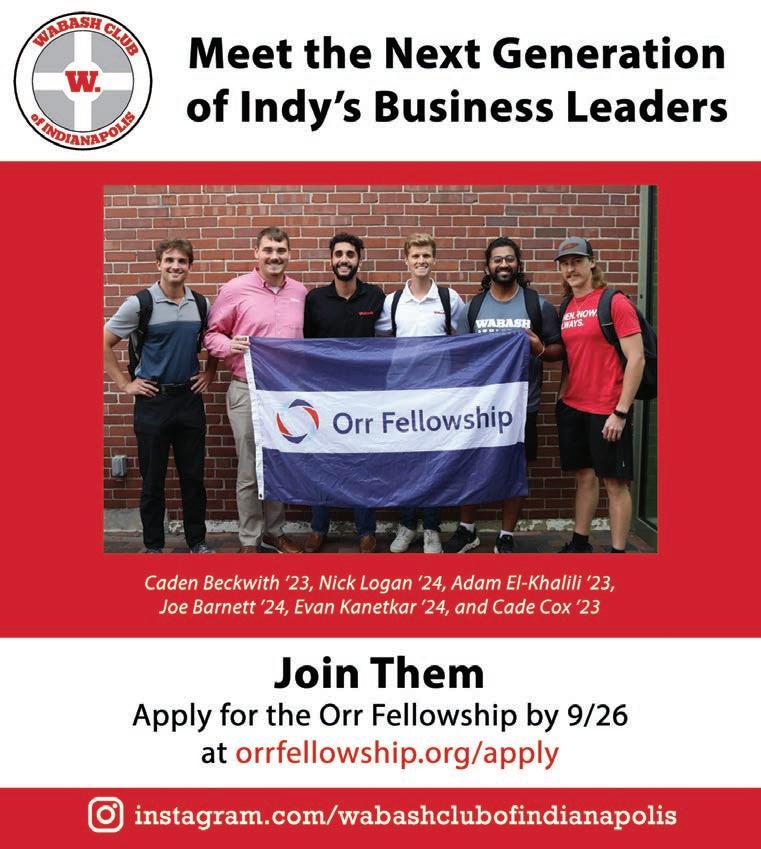
Overlook rocks the Mall at Back to Bash
Bledsoe ’26 takes golf beyond the course



Overlook rocks the Mall at Back to Bash
Bledsoe ’26 takes golf beyond the course

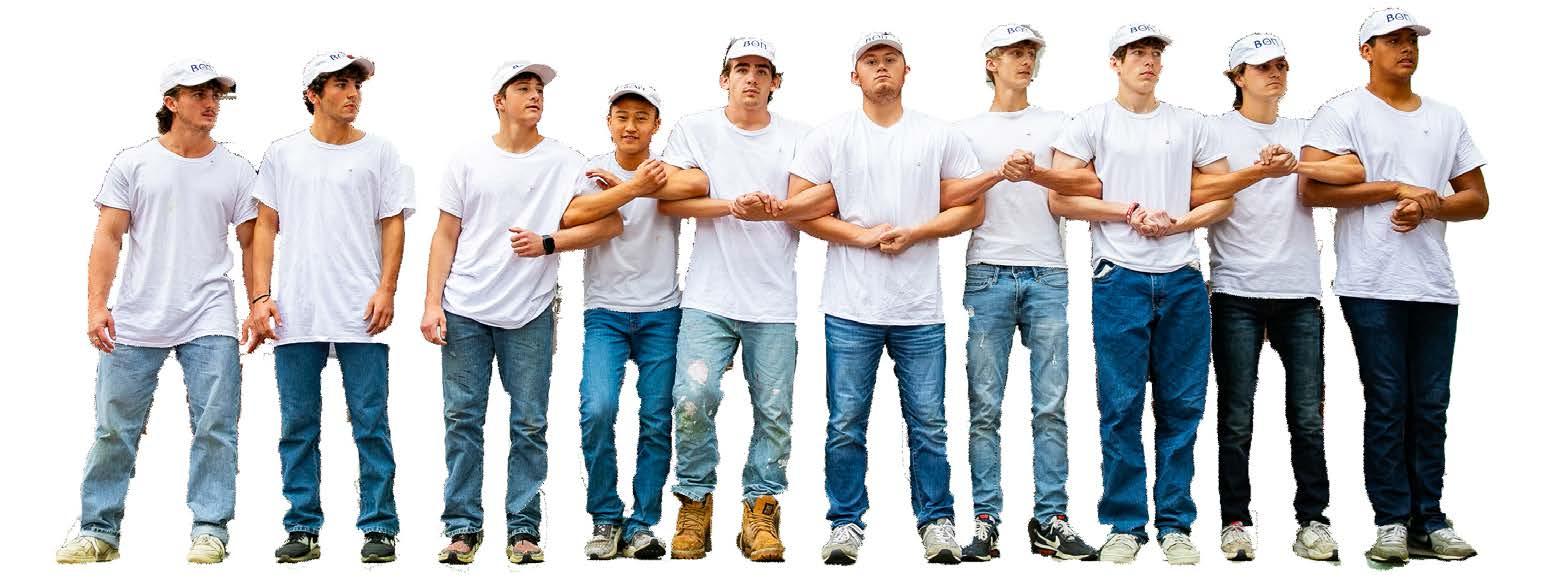
JAMES WALLACE ’26
NEWS EDITOR
Last year, in what was a shock to the Wabash community, the marquee event of Homecoming, Chapel Sing, was a day marked by injury and frustration. Chapel Sing stands alone as the star event of Homecoming Week, representing the collective efforts of freshmen and upperclassmen working together to learn the longest fight song in the nation, Old Wabash.
While normally a day filled with the joyous cheers of freshmen wearing white t-shirts freshly painted with a scarlet W (and maybe a little more joyful from the brothers of Sigma Chi), Chapel Sing 2023 resulted in the injury of one Wabash man and the broken dreams of many others who would not earn their W’s that day.
“An important part of Homecoming is that students should have a memorable experience... but that can only be achieved by keeping safety as our top priority.”
However, after such a mark was left on Homecoming in 2023, the Sphinx Club has made moves to ensure that this year proves to meet all of the expectations of Homecoming, and in some cases, exceed them. This has primarily been headed by Vice President of the Sphinx Club, Connor Craig ’25, who has worked since this summer in preparation for the 2024 Homecoming celebration.
“Nothing’s going to change with the festivities themselves,” said Craig. “I’m just hoping that
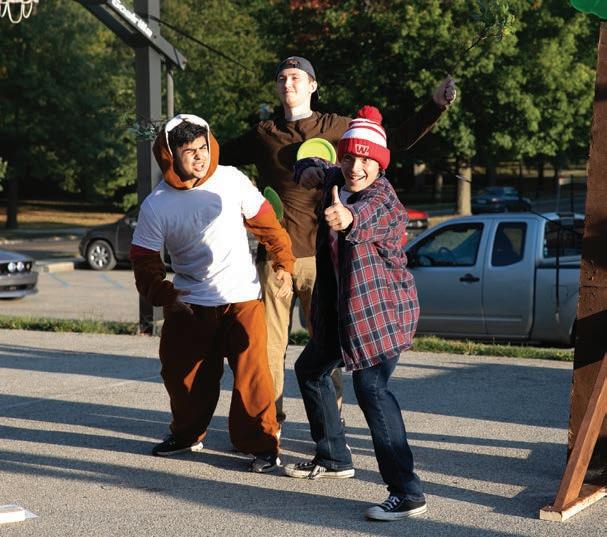
by making things more clear, by having open communication between the student body, administration and the Sphinx Club, people will be more excited about Homecoming and can get further involved.”
This year will not see much change to the scheduling of Homecoming – in fact, every event that was held in the past Homecoming will be making a reappearance – but the manner in which Chapel Sing and the Homecoming royalty charity will be run this year have been overhauled.
Chapel Sing’s reorganization was driven by a reevaluation on the priorities of Homecoming following Chapel Sing in 2023, in which a Beta pledge was physically injured and a singular club member gave three separate freshmen X’s, which disallowed them from the chance to earn a W.
“An important part of homecoming is that students should
have a memorable experience through the rich history of tradition,” said Jake Weber ’25, secretary of the Sphinx Club. “But that can only be achieved by keeping safety as our top priority.”
By creating a variety of documents that list expectations and enforce new rules about Chapel Sing, the Sphinx Club hopes that this year’s Chapel Sing won’t have the same errors that it did in 2023.
“I’ve brought upon conditions on things such as when someone should be getting an X or when they should be getting pulled,” said Craig. “If something were to happen again, we’ve also brought upon consequences for the people involved, since there was a bit of a gray area last year.”
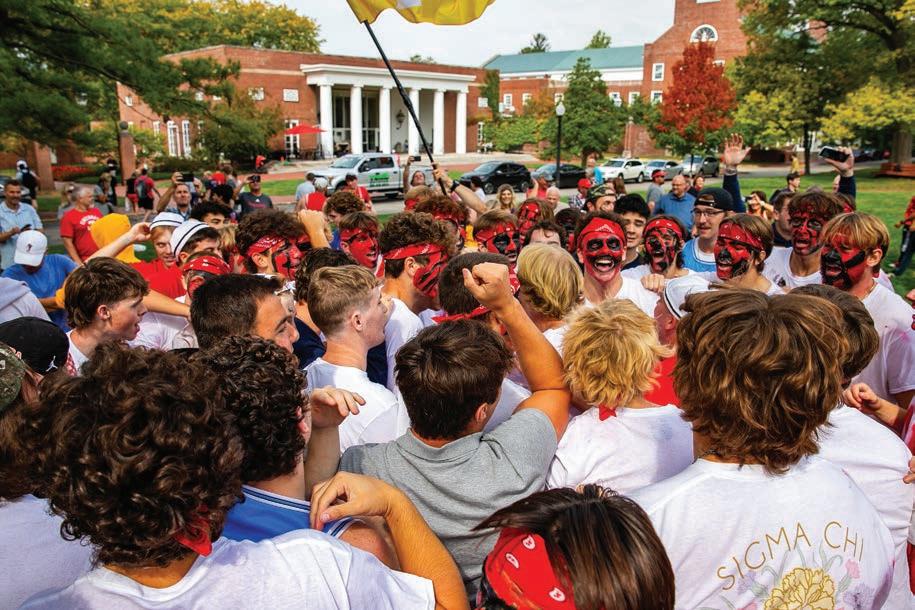
ELIJAH WETZEL ’27
POLITICAL CORRESPONDANT
The start of every school year brings a mix of old and new to campus. New classes, new students, new professors, but also old traditions and old friends.
One of the unfortunate “olds” students have dealt with the past few years is conflict and violence arising out of disagreements over Phi Delta Theta’s pots and Beta Theta Pi’s hats.
Most notoriously, students will steal the pots and hats by running by the pledges and simply snatching their headwear, making off with the prize.
However, if they are grabbed or caught in the attempt, physical altercations can crop up.
Two years ago, a Beta freshman was attacked for his hat on his way to class, resulting in a dislocated shoulder that had to be reset. Since that year, Beta
no longer instructs their pledges to wear their hats around campus; the hats are still worn within the chapter house, but nearly exclusively so.
Conflict isn’t just restricted to overt violence; it hasn’t been uncommon to hear stories from a pledge whose backpack was rifled through and his hat or pot stolen while he was at practice.
These instances of theft and violence surrounding pots and hats are a departure from the good-natured pranks and interfraternity competition of the past. Many students may not know the origins behind the tradition of Phi Delt pots and Beta hats. Pots were introduced in 1920, and originally, every freshman on campus had to wear a pot as a right of passage.
Continued page 2
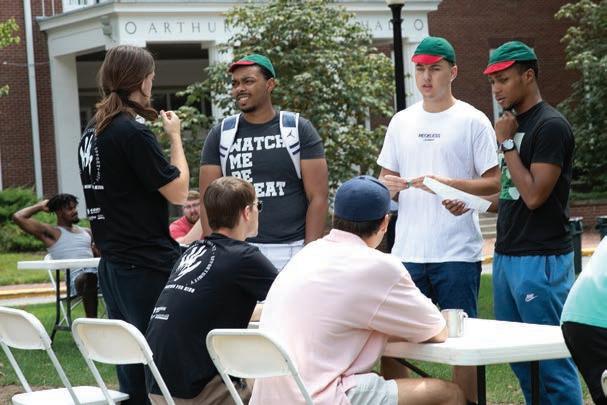
Homecoming has long been a tradition that has encapsulated every student at Wabash. In past years, Homecoming week typically took place later in the semester. However, this upcoming year, it has been moved up significantly and will now occur during the second week of the collegiate season. While this change may not initially seem like a major shift, it could place additional stress on the first-year students who are still trying to adjust to the demands of college life. Although Homecoming is closer to the beginning of the semester this year, leaving less time for freshmen to learn the fight song, some Wabash men think that the fact that Homecoming ends earlier may benefit first-year students in the long run.
“I think that Chapel Sing has been a lot more intense than it would have been for me last year,” said Andrew Weeks, Mental Health Chair for
Gamma Delta. “I believe it’s a much quicker pace and right off the bat we were expecting them to know the fight song. People are probably a lot more stressed out. However, it might be good to get it over with too. It is really stressful, but you’re also not in the meat of the semester yet. So it may be good in the long run.”
“We have certainly had
cautious about how the Homecoming preparations... are going to affect the freshmen and their mental health.”
Eventually, freshmen were no longer required to wear the pots, and by around 1968, no freshmen, besides Phi Delt pledges, wore pots. Phi Delts valued the tradition, and wanted to continue the practice as a way to cultivate fraternity pride. Somewhere along the line, Beta adapted pots into hats, but the motivation behind the accessories was still the same.
“It’s never been a point of hazing or demeaning the freshmen,” said Karston Runge ’25, Phi Delt’s current chapter president. “It’s always been a source of pride and a way of showing that we’re keeping alive a tradition that’s been here for over 100 years.”
“My role as president in the house is to make sure that nothing like this happens, and I failed in that responsibility. I take full responsibility.”
- Karston Runge ’25, President of Phi Delta Theta
While freshman wearing hats and pots has a long and illustrious history, the tradition has not stayed stagnant. Chris Runyon ’26, a junior at Beta, spoke about what the protocol traditionally was after a hat was taken from a Beta.
“From what we understand, before if you went over as a pledge class to the house who stole the hat, you would talk to
the freshmen class there, strike a deal and you’d get the hat back,” said Runyon. “Boom, done, that’s the end of it. But it turned into guys saying, ‘No, I’m not giving the hat back.’ Okay, now it’s to the point where it isn’t even a game, you just stole my hat.”
Freshman wearing hats and pots are key elements of house culture and tradition for Beta and Phi Delt, respectively. For the College and the Deans, most examples of conflict over the practice arises from other people disrupting the tradition.
After speaking with Dean of Students Gregory Redding ’88 he stressed the importance of fraternities having the chance to uphold traditions and conduct their own freshmen education.
“If Beta and Phi Delt want their new members to do that [wear pots or hats], that should be fine,” said Redding. “They should feel comfortable walking down a sidewalk here without thinking someone’s going to come and tackle them or run from behind and steal their hat or pot.”
It is also important to recognize these stories are not always one-sided; sometimes, the retrieval effort can cause just as much strife as the initial theft.
On Tuesday, August 27, 2024, a stolen pot turned sour when the thief was misidentified as Gino Park ’28, Theta Delta Chi (TDX) freshman. Three brothers of Phi Delt showed up at TDX around 4:15 P.M. and asked a brother of the fraternity to let them in because they suspected Gino stole a pot just a few minutes before. They were directed to TDX’s president, Carter Bertsch

’26, and asked for directions to Gino’s room. The Phi Delts said they saw a “small, Asian guy” steal the pot, jump into a black car and drive off. Bertsch was confused because Gino doesn’t own a car, but he went with the Phi Delts to speak with the freshman. Things began to bubble over when Bertsch estimated twenty to thirty more Phi Delts then made their way into the building through the side and front doors. One student brought a golf club in with him. While no violence occurred beyond this, the incident could have turned south. As it turns out, Gino did not even know what a pot was and had been seen
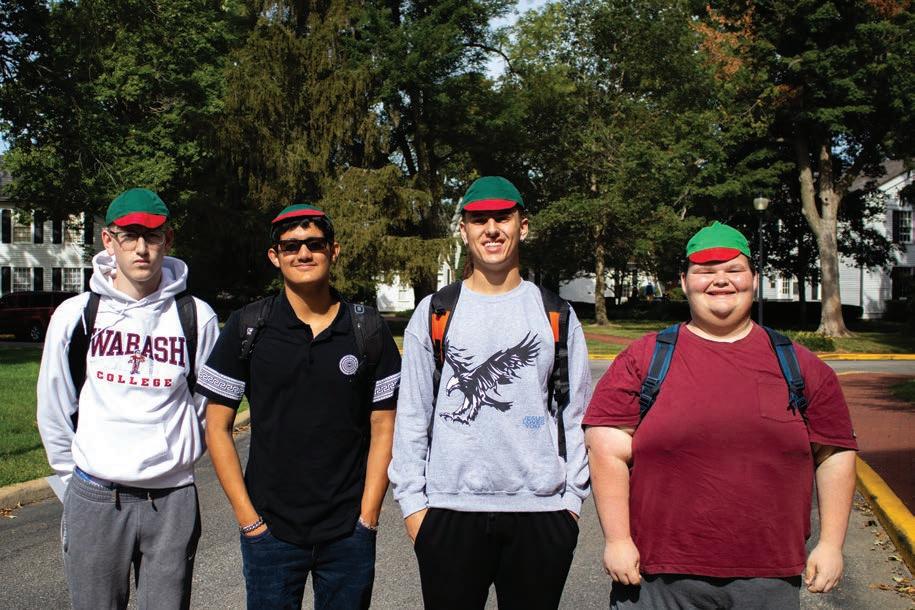

by a fraternity brother eating cereal in TDX’s dining area not even twenty minutes before the theft of the pot.
Thankfully, Park, despite enduring an unsettling fiasco barely two weeks into the year, was optimistic about Wabash getting better from here on out.
“It is my second week, so not a great first impression to be honest, but from what I’ve heard, Wabash has its ups and downs,” said Park. “I think my experience still has a good chance to turn around.”
For Bertsch, the incident was an indictment of a wider culture in fraternities that puts freshmen in difficult situations where they feel as though they must do something extreme, even if it is contrary to their interests. That mentality can be particularly damaging when multiplied in a group setting, as in the case last week.
“I think it puts freshmen in a scenario where, ‘Alright, someone took your hat or pot, now you’ve got to get it back at all costs,’” said Bertsch. “I think that is kind of a bad look on fraternities, especially when the whole freshmen class rolls up on almost a witch hunt to get whoever took their pot.”
Runge, for his part, took responsibility for his involvement and the actions of his brothers and pledges.
“I take full responsibility,” said Runge. “My role as president in the house is to make sure that nothing like this happens, and I failed in that responsibility. So I take full responsibility.”
Of course, the confrontation should have been entirely avoided. The Interfraternity Council (IFC) distributed guidelines this year for, among other traditions, Beta hats and Phi Delt pots. In order to ensure safety and the safe return of the hats and pots, IFC banned the theft of hats and pots off of pledges’ heads. This is not an area the IFC wants to be involved in, according to IFC President Matt Lesniak ’25, but with the injuries and conflict in recent years, their hand was forced.
“I don’t want the IFC to have to meddle into every house’s business,” said Lesniak. “But the fact of the matter is it’s needed because if it isn’t the IFC doing stuff, it’s going to be the Deans.”
However, Lesniak is optimistic about this year, and he believes the students have the ability to tighten things up while also pursuing a truer form of a long-valued tradition.
“If we could have zero incidents for the next two or three years, I think campus could get another shot at going more old school with some of our traditions, like where you run and steal a pot off somebody’s head,” said Lesniak.
The responsibility lies with the students. A student body obsessed with tradition and preserving culture can have boisterous fun and mischievous competition, but, at the end of the day, civility and respect needs to come first.

This year, rather than giving every club member the power to individually give a student an X, this power will be restrained by the executive board of the Sphinx Club.
“We’ve implemented a two-witness rule,” said Craig. “Only two members of our executive board will have Sharpies, and that’s it. When someone gets pulled by a Sphinx Club member, one of the executive board members will quiz them and will only give an X if there is a clear mess up.”
Weber, as an executive member of the Sphinx Club, will be one of those with a sharpie during Chapel Sing. Unlike last year, in which a member intentionally marked multiple X’s, Weber assured that the current
Sphinx Club does not follow that mentality.
“No one in the Sphinx Club wants to see students walk away with an X,” said Weber. “But if you don’t know our fight song you leave us no choice.”
Another change to Chapel Sing is the length of time –students won’t have to wait as long for results, as the Sphinx Club will be using automated spreadsheets to process scores instantaneously, which will also point out any irregularities in scoring. This has been a point of frustration in the past, as Chapel Sing would often go over time as Club members crunched scores by hand in the Chapel.
“We’ve changed the judging process to online, via spreadsheet,” said Craig. “There won’t be a delay, and there will be a standard deviation function,
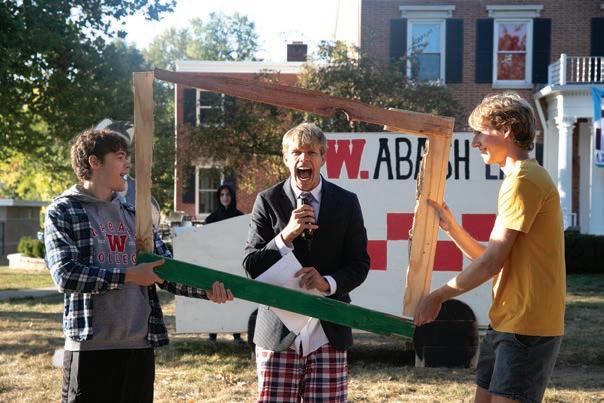
so if there are outliers, we can point them out and question them.”
Craig has also been proactive in ensuring that everyone will get a fair chance to sing the fight song, regardless of any limitations.
“I’ve been collecting a list of international students who may have language barriers and other students who may have situational conditions, such as a student who just had vocal surgery,” said Craig. “The last thing I want is a student getting pulled when they’re not singing loud enough when they physically can’t.”
While the restructuring of Chapel Sing may seem flashier to many students, Craig and many fellow Club members have worked to also improve the philanthropy aspect of Homecoming, which historically has been limited to only the Homecoming Royalty event.
“I want to raise as much money as possible,” said Craig. “So, we decided to stretch the fundraiser out to an entire week.”
By making the Homecoming Royalty event the crowning moment of a weeklong fundraiser, the Club is hoping to raise more resources for the charity selected this semester – Meals on Wheels.
“I am pleased with The Sphinx Club stepping forward to help us,” said Pat Stull, Director of the Crawfordsville branch of Meals on Wheels. “They are reaching out to the community they are living in. Funds raised help to pay for client’s meals, who sometimes cannot pay due to medical costs or income problems.”
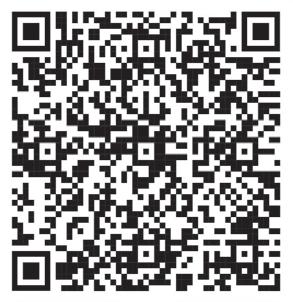
Even with the charity aspect of homecoming being a week long, students can still look forward to seeing Homecoming royalty walking around during the day of the Homecoming day itself.
Craig hopes that this extension of the philanthropic element of Homecoming will lead to more community involvement as a whole by the Sphinx Club.
“I feel pretty inspired about doing this and more community work,” said Craig. “I plan on doing a lot more events like this.”
All of these changes to homecoming – both to Chapel Sing and the philanthropy – have been the result of many weeks of work by Craig and his subcommittees of Club men, such as
the philanthropy committee and public relations committee. But Craig is quick to acknowledge that all of this work towards change is going towards a timeless Wabash tradition.
“It’s been hard to be selfless during this process; I’ve put all this time and planning into [Homecoming],” said Craig.
“But recognition isn’t something I can expect, the expectation is that Homecoming runs well. For me, if I see smiling freshmen after they get their W or people having a good time during tailgates, or brothers having fun making floats and banners, that’s my metaphorical pat on the back.”
Continued from page 1
they still face the challenges of adjusting to college level classes, rushing a fraternity and trying to memorize the fight song. When those three are shortened by two weeks, it can cause higher stress.
“With the shorter Homecoming week, it has definitely accelerated the rate at which things need to get done and it adds an extra layer of stress because it’s still really early in the year, and I’m still trying to figure out how to balance classes with clubs in addition to memorizing the song,” said Nicholas Kreis ’28.
“I’d say the study tables (a fraternity requirement to study together for a set amount of time) has been very beneficial for helping me and the rest of the freshmen help balance out everything else that is going on.”
However, due to the added stress put on by early Homecoming, opinions on this shift vary with some expressing the potential challenges it may pose. Especially from those who are in a position of Rush Chair or New Member Educator who have to adjust to Chapel Sing being closer than usual.
“We had to warn these guys throughout the rush process, pretty much instantly,” said Ethan Hill ’26, rush chair and new member educator for Theta Delta Chi. “We expected them to be practicing the song and to at least know portions of it. For the new member education, we have had to do longer practices than what had normally been done in the past, just to make sure the guys know the song.”
Similarly, other fraternity leaders have also had to take similar measures to help ensure that their new freshmen would succeed. Some of which require setting new expectations.
“We have certainly had to be extra cautious about how the homecoming preparations for activities and festivities are going to affect the freshmen and their mental health,” said Luis Rivera ’25, president of Lambda Chi. “Even though they are associates right now in our house, they’re students first, and that’s certainly something that we have been working to keep at the forefront of all of our decision making and planning for homecoming.”
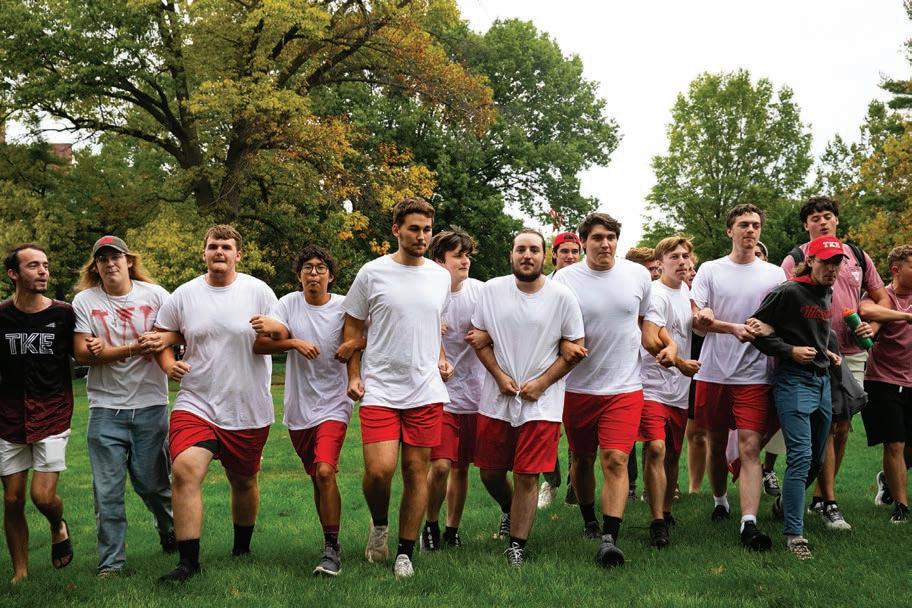
Saturday, Sep. 7 1 p.m. | Football vs St. Norbert
Monday, Sep. 9
12:10 p.m. | Div. 2 Humanities Colloquium, Hays 104
Tuesday, Sep. 10
9 p.m. | Presidential Debate Viewing
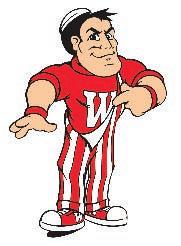
Thursday, Sep. 12 11:15 a.m. | Chapel Sing
Friday, Sep. 13
12 p.m. | The Ethicist with Kwame Anthony Appiah, Baxter 101
Saturday, Sep. 14
2 p.m. | Football vs. Ohio Wesleyan
X & IG: @bachelorwabash
FB: Wabash College Bachelor
EDITOR-IN-CHIEF
Sam Benedict • ssbenedi25@wabash.edu
MANAGING EDITOR
Logan Weilbaker • laweilba25@wabash.edu
NEWS EDITOR
James Wallace • jpwallac26@wabash.edu
EDITOR
OPINION
Preston Reynolds • pcreynol25@wabash.edu
FEATURES EDITOR
Nathan Ellenberger • nvellenb26@wabash.edu
SPORTS EDITOR
Ethan Wallace • ewallac25@wabash.edu
PHOTO EDITORS
Elijah Greene • eagreene25@wabash.edu
Will Duncan • wjduncan27@wabash.edu
The purpose of The Bachelor is to serve the school audience, including but not limited to administrators, faculty and staff, parents, alumni, community members and most importantly, the students. Because this is a school paper, the content and character within will cater to the student body’s interests, ideas, and issues. Further, this publication will serve as a medium and forum for student opinions and ideas.
Although an individual newspaper, the Board of Publications publishes The Bachelor The Bachelor and BOP receive funding from the Wabash College Student Senate, which derives its funds from the Wabash College student body. Letters (e-mails) to the editor are welcomed and encouraged. They will only be published if they include name, phone, or e-mail, and are not longer than 800 words.
The Bachelor reserves the right to edit letters for content, typographical errors, and length. All letters received become property of this publication for the purposes of reprinting and/ or redistribution. Profanity may appear in the publication, but only in cases of direct quote or if profanity is necessary to the content of the story. Please do not confuse profanity with obscenity. No article or picture of an obscene nature will appear in this publication.
The Bachelor is printed every Thursday at the Purdue Exponent in West Lafayette. It is delivered freely to all students, faculty, and staff at Wabash College. All advertising published in the Bachelor is subject to an established rate card. The Bachelor reserves the right to deny requests for publication of advertisements. Student organizations of Wabash College may purchase advertisements at half the listed rate.
The Bachelor is a member of the Hoosier State and Indiana Collegiate Press Associations (HSPA and ICPA).



WRhys Cadigan '27
Reply to this opinion at rbcadiga27@wabash.edu
e all know that moment when you’re in class and that little buzz in your pocket distracts you from the professor’s lecture. Only to find that it’s an email chain 20 messages deep about pineapples on pizza or something else unrelated to who is speaking at the next Chapel Talk.
We also all know the characters on campus, those among our ranks whose nicknames stick and elicit a reaction that no typical name could spark.
These people are special to our collective identity as a campus, they serve an integral part to the “Wabash Experience” as it is happening in our times here.
However, lurking beneath the email chains and silly names are some bad actors. Wabash has a clout chasing problem, which is taking away from what makes these characters on campus so special and beloved.
The elephant in the room are the all-campus email warriors. We all know how this goes someone accidentally hits reply all and another person must have the last say in the matter. Rather than leaving it at that, someone attempts to capitalize on another’s embarrassment. Or worse yet, a full-blown spat for the entire campus to live vicariously through via their inbox. The allcampus email function is incredibly useful: club callouts, brotherhood events, important information and so on.
However, when our inboxes are clogged by bloat from someone who knows very well what they are doing puts a bad taste in my mouth. I
cannot help but get annoyed at yet another email notification from my already full inbox. Having to sift through these, for all intents and purposes, useless emails, is tiresome.
But the clout chasing does not stop there. Our campus is graced with the presence of many colorful characters. Part of the reason I chose Wabash College was because everyone can know everyone. The characters and nicknames float around for everyone to know, a collective inside joke we can all enjoy.
These personas are organically crafted by the environment we all find ourselves in, but some people are attempting to force themselves into that mold. They fail to see that the reason these people are so revered is because they didn’t necessarily work for it. They are themselves and the student body loves them for it, quirks and all.
When someone tries to fit into the mold of a public figure, they stand in complete contradiction to what makes a public figure. We love them because of their uniqueness, it’s a testament to how different each man who becomes educated here is. They do what they do, and the student body responds to their bold uniqueness by referring to them with nicknames and a cult-like following.
To summarize, Wabash has a clout chasing problem. People trying to force their way into the collective memory of the student body, by any means necessary. A way to cement their legacy at this institution. But they fail to understand why we revere these students so much; they contrast with the student body, they are loved for their uniqueness, and what makes them different.
There is something in each of these iconic characters on campus we can all identify with or attempt to emulate. A campus leader, a unique and fashionable wardrobe or just being someone we can all look up to.
Wally’s wall: Heists of the century
The Prompt:
What is your best fraternity heist?

FIVE THINGS WORTHY OF A HI-FIVE THIS WEEK
WHAT THE FORK?
Hi-Five to whoever stole all of Lambda’s forks. Chopsticks on top! CHAT, IS THIS REAL?
Hi-Five to Prof. Dunaway for streaming Cookie Clicker. That’s a fourth hour activity we can all get behind. SLIPPERY WHEN WET
Hi-Five to the K-Sig who won the TGIF slip-n-slide contest. Does weighing yourself down with McNuggets count as doping?
THE EMPIRE STRIKES BACK
Lo-Five to Germany for electing a farright party for the first time in roughly 80 years. Don’t say we didn’t warn you! BUSINESS ON TOP, PARTY DOWN BELOW
Lo-Five to all the guys rocking the basketball shorts and suit jacket combo. It is truly the mullet of Wabash fashion.
Anonymous FIJI
I stole a ripstik and a composite from DPU FIJI before befriending said FIJIs.
Anonymous ’67
In 1965, I fooled D****w admissions staff into letting me develop blueprints that detailed the location of the Monon Bell. The resultant heist went down in history as “Operation Frijoles.”
Anonymous Phi Delt
A while back, we stole a whole poker table from Beta. Two or three guys snatched it in the night, throwing it in the back of a pickup truck without getting caught. I have been told that Betas thought the table was “just missing” for a month or so afterwards.
About two years ago, we stole a couch from Theta Delt and walked it all the way across campus. We returned it on amnesty day, but apparently they did not want it back. The next day, two Theta Delts came by and delivered it back to our courtyard.
Anonymous ’25
A couple years ago, I took a K-Sig “Senior Academic Achievement” Award. I will probably give it back at graduation. But, for now, it rests at my bedside at home, reminding me of the academic valor of Kappa Sigma.
Anonymous Delt
The door.

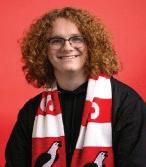
Carson Wirtz '26
Reply to this opinion at cjwirtz26@wabash.edu
It’s Saturday morning. You walk out of your living unit to run to Walmart to pick up some food and libations for the evening. Wait what? My car’s windshield is shattered! Where’s the golf clubs I had in the back seat? Where’s the cash I kept in the glove compartment?
You feel your mouth go dry, and you put your hands on your head when you remember there’ are no cameras or witnesses to what happened.
Like the majority of Wabash folks, I quite like the Gentleman’s Rule. It’s a great umbrella of policy that succinctly and clearly states the Wabash community’s expectations of students. But what happens when there are substantial violations of the Gentleman’s Rule around campus? Or when local crime finds its way in?
I say this because the hypothetical situation mentioned in the introduction of this piece isn’t hypothetical at all. It has happened in my time at Wabash. It seems clear to me that there are enough issues to justify an additional security measure: cameras on campus.
As a junior, I’ve seen too many extreme incidents take place across campus that security cameras would likely prevent, or at least provide aid in investigations. When the Safety & Security Office gets a report, or sometimes even Crawfordsville Police Department, of an incident on campus, what is there to investigate?
They may clearly see something was stolen, broken or vandalized, but what more can we really expect them to do or say? Maybe a couple phone calls to administrators or other campus leaders? A police report? For me, that simply isn’t enough.
I know there may be some in the Wabash community skeptical of the need for cameras. Does enough really happen around here?
From my point of view, absolutely.
What has happened in my two years at Wabash so far? To list a few examples: A fraternity gets vandalized with spray-painted homophobic slurs across their front doors and windows. A window mysteriously shatters overnight. Someone breaks into living units, steals from them and destroys personal and college property. Students’ cars get broken into and ransacked. Countless incidents of fraternities having irreplaceable traditional pieces stolen (this issue seems particularly rampant this semester). How much more needs to happen before we accept the need for action?
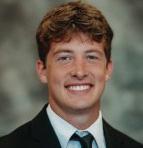
Elijah Wetzel ‘27
Reply to this opinion at ejwetzel27@wabash.edu
T his past spring, my EQ class watched
“The Social Dilemma,” a 2020 docudrama film that combines interviews from executives, software engineers and insiders from the social media industry with fictional narrative of a teenager who becomes entrenched in an online conspiracy circle primarily because of his inability to control his desire to use his phone. The film was eye-opening on several levels.
The degree of control companies have over what content relatively small population groups see, the total concentration of that control amongst a small number of tech executives and their software wizzes and companies’ knowledge of the psychological chinks in the armor humans have that make us susceptible to certain product features are, frankly, scary propositions.
On a more personal level, though, my experience watching the film made me more conscious of how often I picked up my phone and, more importantly, why I reached for it in the first place. More often than not, I, and probably most people with smartphones, check them when a notification vibrates. This call and response (no pun intended) relationship with notifications can be detrimental in and of itself.
Companies and apps use notifications to direct our minds in directions that they choose, undermining our own thoughts in favor of one’s oriented around their product and too many notifications even good, necessary ones can draw attention
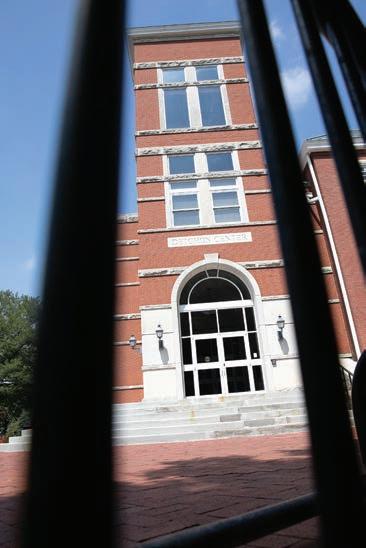
I don’t say all this to paint Wabash in a bad light, not at all. I’m simply stating the fact that enough happens around here to justify some added security resources.
Now, when I say that we should add security cameras around campus, what do I mean by that? To what extent? The answer, honestly, is places that would be considered a minimum standard on most college campuses. Namely, I would endorse having at least one camera in each parking lot, and on a door or two of each building.
Could you imagine how much more Safety & Security and CPD could do for you if your car gets broken into if they can see video footage of who broke into your car, when they did it and how, and what they took? It would be a heck of a lot more than what they can do now. This set up also would not invade anyone’s privacy but would do just enough to be a resource when bad offenses happen.
Wabash is no stranger to security cameras either. Many readers likely know that Wabash has security cameras in and around the Allen Center. Why? Because Wabash has lovely, expensive equipment and resources in the Allen Center that they don’t want to be messed with or stolen. I think this is a great move from the college and is a commonsense solution to a problem they were and are concerned about.
Shouldn’t the college show the same amount of concern and solutions for the students, faculty and staff as well? Furthermore, cameras can also protect college property all over campus, not just personal or fraternity property. I believe that investing in the longterm solution of a basic security camera system would be a fantastic example of Wabash College standing TALL, as they expect their students to do.

away from important tasks and make us inefficient.
Embarrassingly, studies have shown that many smartphone users suffer from some level of “phantom vibration syndrome,” where one will feel a vibrating sensation, prompting the usual phone check, only to discover that there was no vibration.
But as much as I believe notifications can be dangerous, they aren’t all bad and can certainly be managed. More troublesome, from my perspective, is why we pick up our phones when a notification has not alerted us to do so.
Too often, we look at our phones just because there seems like nothing else to do. That assessment assumes a level of consciousness often lacking when we pull our phones out, too. Our problem is an addiction to entertainment and quick, flashy stimulation.
I don’t want to go full Boomer-mode, but I think it is a fair claim to make. It’s not a fault with recent generations but a mark of how adept companies are at exploiting our dopamine receptors to keep us coming back to our phones, tablets or computers.
One of the many problems and in my mind one that, if remedied, can be most transformative for us caused by our habit of filling every spare second with our phones, is that we have no tolerance let alone an appetite for boredom. “Why,” you might say, “that sounds like a good thing! Why should I want to be bored?”
For one, boredom can provide needed rest for your mind. A day can often pass at breakneck speed, and we rarely give ourselves the time to ease up and simply enjoy an opportunity for quietude. Boredom will also make us better thinkers. I doubt that many of the world’s deepest thinkers, the people contemplating groundbreaking innovations in their respective fields, usually find their spark of genius in a malaise of scrolling.
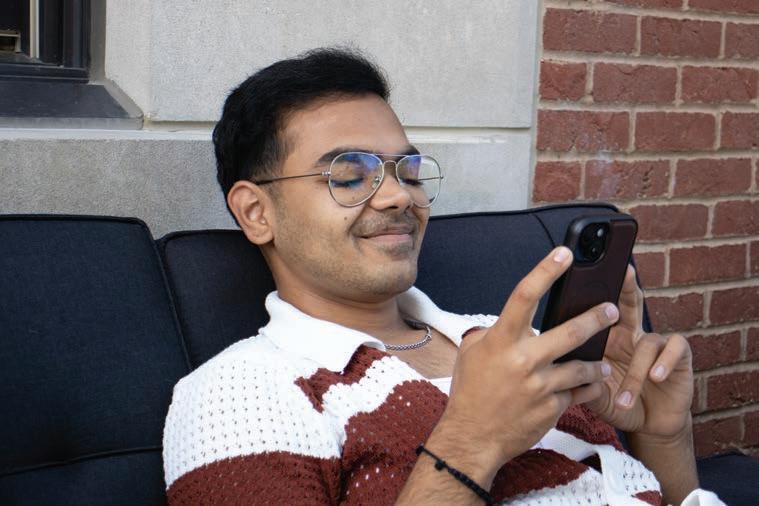
More likely, they spend a great deal of time turning the problems they face around in their minds, really chewing on the tough portions where others have given up. I’m not saying that we’ll all turn into Plato by embracing boredom.
However, I believe if we spend more time thinking deeply about difficult problems facing our communities, moving literature we read in a class or even contemplating how we can be better sons and brothers, we’re much more likely to find our own sparks of genius.
Most importantly, boredom can teach us to see others better. We live in a time where suicide, anxiety and depression, and loneliness have risen dramatically in the last twenty years. I think that a part, perhaps a large part, of that rise is a decrease in our courage and capability to reach out to each other. We are deeply relational, social creatures; it is essential we come into contact with other people.
Literally! Studies have shown that human touch can lower blood pressure, lessen anxiety and boost your immune system. Be the kind of person who strikes up a conversation with someone they don’t know. You and the person you’re talking to will almost certainly get more out of that conversation than whatever you might have come across on your phone. And there is all the possibility that your willingness to be open and have a conversation will mean a lot more to your conversation partner than you ever thought it would.
Try it for a week. Each time you have the urge to pull out your phone just to fill some time, consciously decide to leave it where it is and be bored for a while. Be at rest, think deeply or look for someone to talk to. Embracing boredom is a small behavioral change, but I believe it can change us in big ways.

F
Isaac Grannis '26
Reply to this opinion at idgranni26@wabash.edu
ake News. Alternative Facts. Misinformation. Conspiracy Theories. For the past decade, these terms have become unavoidable in our national discourse - and not without reason. It is easier than ever to both access and disseminate incredible amounts of information across the world, making critical thinking and civil discussion ever more important for our daily lives.
More simply, we need to be able to figure out what is true and what is not. However, the words we use matter and our collective vocabulary has become an obstacle to that truth-finding process.
Let’s look at the recent past: four years ago, an article about Hunter Biden’s laptop was labeled “Russian disinformation” and blocked from dissemination on most social media platforms. It was completely true.
Three years ago, the ‘Lab Leak’ hypothesis was a “conspiracy theory.” It’s now the leading theory for COVID-19’s origins.
Four months ago, videos and evidence of President Biden’s senility was “rightwing misinformation.” The truth of that “misinformation” became so apparent that it caused the President to drop out of the race in one of the most chaotic political upheavals we’ve seen since the 1960s.
These terms have been repeatedly applied to ideas we now see as accurate or reasonable. Now, this is not necessarily wrong. Every society, small or large, has at least some segment of its beliefs change over time.
But these terms are not merely neutral labels they have repeatedly been used
to hurt those who disagree. Promoters of the Hunter Biden story were willfully ignorant or malicious spreaders of misinformation. Supporters of the Lab Leak hypothesis were racist conspiracy theorists. People who posted videos of Biden were partisan hacks and spreading “cheapfakes.”
Further, none of these labels emerged out of sober discussion of the facts involved in each case. Fifty intelligence officials called the Biden laptop story disinformation, and it became so. The NIH actively sought to suppress and discredit the lab leak theory, so it became a conspiracy.
The White House worked to hide the decline of the current leader of the free world, and thus, evidence they didn’t like became misinformation. On top of it all, much of the media including many “reputable” outlets echoed and reinforced the narratives and lies created by these organizations.
A plethora of government agencies and much of the press have consistently dem-
onstrated an inability to deliver the truth and a remarkable skill of delivering lies instead. Whether these instances were the result of malice or ignorance is immaterial—in either case, trust has been seriously eroded. Along the way, “misinformation” and the like have become little more than thought-stopping ad hominem.
Today, more than ever, the responsibility of determining truth lies with the individual. You cannot and should not rely on the press or the government to give you the facts - those intellectual shortcuts are simply not safe anymore.
When you see an idea or a story labeled misinformation, pause a moment. Who is calling it misinformation? Why? Is it clearly untrue, or simply a perspective someone disagrees with? The modern world requires us to earnestly engage with the substance of “misinformation” and “conspiracy.” To do otherwise is to risk missing the truth and harm our already-strained national discourse.

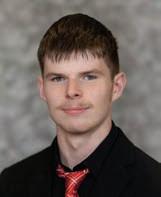
T o all athletes, bodybuilders and weight room enjoyers,
Have you ever been hyped up on preworkout or the simple willpower to lift some heavy ass weight (Yes, that was a Ronnie Coleman reference), headed to the Allen Center to absolutely demolish chest and arms and get the most earthshattering pump anyone has ever seen?
Then suddenly, when you arrive and open your AirPod case or hit the power button on your headphones, you’re faced with the harsh reality that they are dead and all you’re left with is the combination of silence, grunting and moaning from your brothers.
While this may be music by itself, I would much rather be listening to Ozzy or Van Halen on an everyday rock and roll radio station. This leads me to my question: Why the hell is there no music in the weight room?
As a junior and fellow athlete/lifter here at Wabash, this has always stumped me. Could this be a personal problem? Possibly.
However, regardless of other opinions, I thought I would give this issue a good small rant. I hope Wabash takes this idea into consideration.

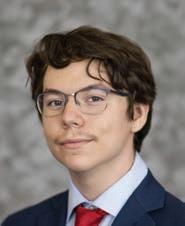
B
eing a senior gives you a unique perspective on Wabash. I remember my first tour here, seeing the Arboretum, the Mall, all the fraternities and I remember seeing it all through rosetinted glasses. To me, there was (and is) an undeniable specialness here which can be overwhelming for a freshman.
I hope you all can appreciate that specialness, but maybe you threw your rosetinted glasses out without even opening the box. Or perhaps you’re still wearing them. Or maybe you’re an upperclassman bogged down by increasing workloads and haven’t thought about them in some time. If you have those glasses in your filing cabinet of Wabash memories, indulge me and pull them out. But if for some reason you threw your pair away and resisted the temptation of awe. I encourage you to ask people about the beauty they see
here, whether literal or metaphorical.
My hope is that it inspires you to view Wabash through a different lens.
Freshman year it’s easy to see the beauty of the campus but many don’t take the time to stop to appreciate it. Time flies here and most of us get wrapped up in the monotony of class, sports and clubs. If you are a freshman, I’m going to tell you this now sophomore and junior year happen quickly and it’s easy to get wrapped up in routines and status quo.
My best piece of advice is to be cognizant, you may sell yourself the lie that you’re “too busy” and can’t afford to dedicate more time to other clubs. This is a lie that hurts nobody but yourself.
It’s possible that clubs may not be your limiting factor, it could be sports, a difficult class load or officer positions that dominate your time. No matter what is on your plate you must resist the lie. The question then is, how? Now the most simple approach is to effectively plan. Effective planning may be a boring Thanksgiving dinner topic but it is a skill that will push you far. If you aren’t using your preferred calendar to keep track of everything you have going on, not only will you forget things but you will waste time. Use the calendar not only for classes and meetings with professors but sched-
ule dedicated study time, campus events (TGIF, Chapel talks, sports, lunch talks, etc.) and schedule breaks. We aren’t academic machines, we need breaks. If you’re gonna come back from Lilly at 10 PM and play videogames for an hour, put it in your calendar.
However, I won’t belabor this point, just use the calendar and look at it frequently. I’m going to pretend that all those reading this have already stopped by this point and made perfectly constructed, color-coded calendars. Even in the most well constructed calendars, there are gaps which can be filled. The most important thing you can do to make your experience here satisfying and to leave with minimal regrets is to fill these gaps.
This will be different for everyone. This may mean joining more clubs, starting the club that is perfect for you or even picking up another major or minor which is another way of maximizing your time here. For me, I’ve found five clubs/committees (College Mentors for Kids, La Alianza, TableTop Gaming Club, Orchestra and W.A.R. Council) that fit into my schedule all while balancing two majors and minors and even I still have gaps! I encourage you all to reflect on your time here, we all have moments where we feel “too busy” but don’t let
these moments cloud your judgment. Build a resistance to the lie. If you haven’t developed some resistance to the lie in your time here, those rosetinted glasses may be your greatest ally. It’s important to note that I’m not saying all of this to undersell the difficulty of Wabash. But it is much too easy to take our time here for granted.
Take a step back and appreciate the beautiful arboretum before the leaves fall off. Take a step back and find a new thing to appreciate the specialness of. Find a club that will make you happy and get to know the people in it. The most beautiful thing you can find here is in the brotherhood. Every club has members from different fraternities, living units and sports teams. Find your niche, find your community, find something special. There’s always going to be something that appeals to you here. If for some reason you don’t believe me, just open Engage and look at the list of clubs. There’s a wide range of focuses: cultural clubs, sports clubs, music, religion, politics. Whatever your biggest hobby or passion is, there’s likely a club for you and if there isn’t one take the initiative and create something you can cherish.
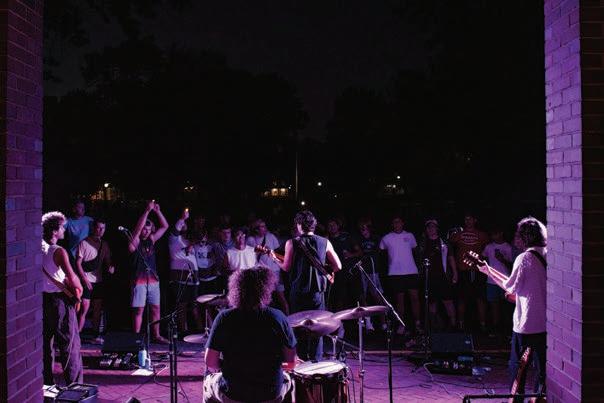
meet someone and
TY MURPHY '27
Hailing from Nashville, Tennessee, a young band had no idea they would take Wabash by storm. After dropping out of their respective colleges, drummer Colin Christensen, guitarist James Haines, singer and guitarist Carson Bull and bass guitarist Sam Bellavance would form a band that Wabash College would come to know well. That band is Overlook.
“So, we all dropped out when COVID-19 happened, because that took everything online,” said Haines, also known as Jimbo. “During quarantine, we all kind of got the band going, then we moved to Nashville about two years ago and have been working on it full time down there.”
Wabash also owes thanks to Wabash alumnus and Overlook fan page owner Ben Axel ’23. The
band's high school friend recommended them for their first performance at the Lambda Chi Alpha house before their return last year for the National Act afterparty performance, also at Lambda Chi. Both times, they spoke highly of the Wabash crowd.
“Everyone's ready to go,” said Bellavance. “Let's have a good time.”
With two campus performances under their belt, Overlook was becoming a Wabash staple, and they would capitalize on this by coming back a third time for Big Bash, paid for by the Student Life Committee and Student Senate. However, this show would be extra special for Overlook.
“Do you know how Oppenheimer did the Trinity test?” said Jimbo.
“This is our Trinity performance.”
There was a lot in store for the show with classic cover songs and
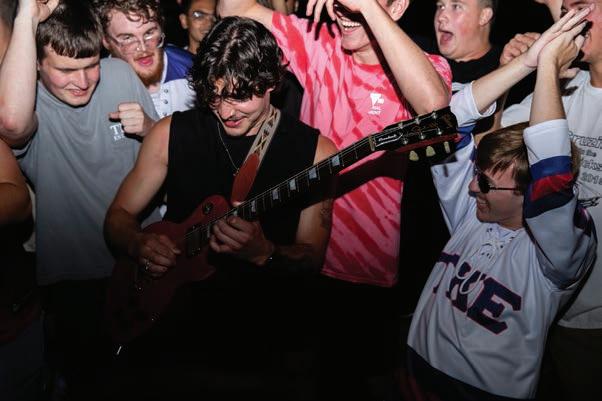
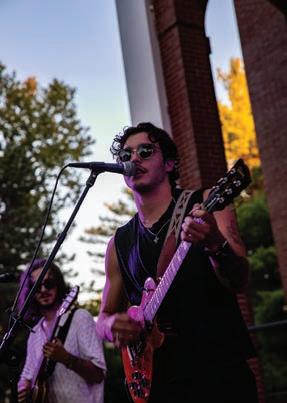
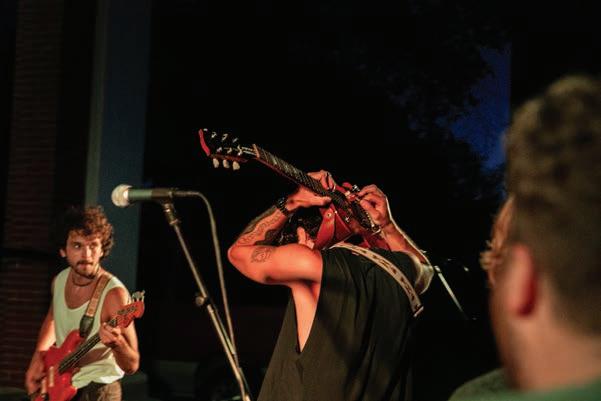
a special surprise during the show.
“We're playing an unreleased song that we'll talk about when we're up there, but a song is coming out September 3 and we're playing it tonight,” stated Bull.
“It's called ‘Run for the Hills.’”
With a lot in store, the band had only one ask for a crowd that had welcomed them twice before.
“We just want them to dance, sing along, talk to a stranger, meet someone and have fun,” said Bellavance.
After a performance by the DJ duo Play the Gents, Overlook would take the stage on the Pioneer Chapel steps. With impressive drum solos, behind-the-back guitar playing and more, the band was able to mesmerize an impressed Wabash crowd.
“Overlook never fails to disappoint,” said Zach Geleott ’27. “The enthusiasm of the band is
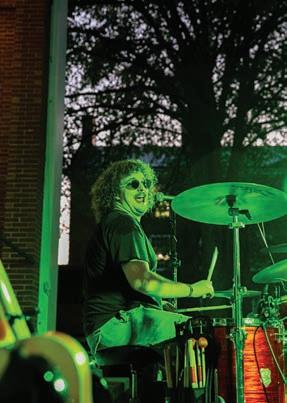
second to none – they really do a great job involving the crowd and playing what the people want to hear. I’m hopeful they’ll make an appearance again in the spring, and until then I can’t wait.”
And the praise did not stop there.
“Their performance was very real; and they were trying to connect with the audience,” said Sarvik Chaudhary ’25. “Even though they had a very small audience at the end, they brought a great show for all 20 guys who were present. They had a lot of energy throughout.”
Despite not having the largest crowd at Back to Bash, Overlook would make it memorable for all that went. With unreleased music, classic cover songs and an intense enthusiasm, viewers were all singing along, dancing and enjoying the show just as Overlook had
hoped for.
“As long as people are having a good time, we'll have a good time,” said Bellavance.
As it got dark, Overlook closed out the show with a cover of ‘Free Bird’ by Lynyrd Skynyrd before fans got to take a picture with all members of the band before rushing to the merch table to talk to them more.
From meeting in high school in 2016 to dropping out of college during the pandemic, a high school friendship would lead Overlook to playing at the Lambda Chi house. After two high energy shows, they would return for their third to start the school year off with a performance at Big Bash. Is this the last time Wabash college will see Overlook or will the high energy crowds bring a fourth performance by the band? If the reactions on Yik Yak mean anything, it
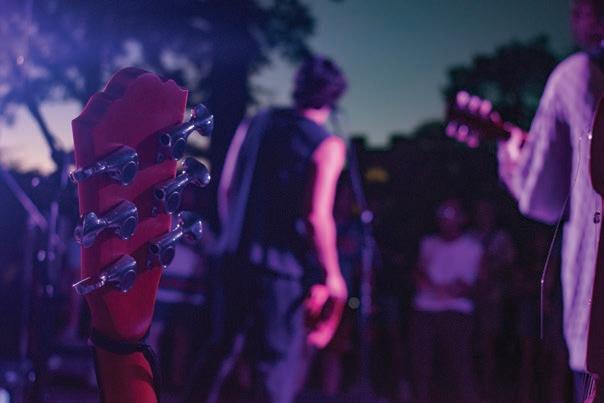
ELIJAH GREENE '25
EDITOR
PHOTO
If you weren’t one of the thirty people left on the Mall at 9 p.m. on August 31 absolutely dancing your heart out to the solo of “Free Bird” being played behind the head by Overlook’s lead singer Carson Bull, I feel sorry for you. A firmly-established pillar of Wabash at this point, Overlook came to Crawfordsville for Back to Bash on a mission: to absolutely rock our socks off. And they did, with amazing effect. Overlook has seemingly cracked the code for the set to light campus ablaze, seamlessly blending their own catchy originals with covers of crowd favorites in a dazzling display of musicianship. They were funny, charismatic and able to convince a crowd full of Wabash men playing beer die on a Saturday evening to abandon their games and come jam in front of the Chapel. Not only were they fun to interact with, they were excellent musicians too. Their sound was superb, and each band member was given the chance to show off their talents in different songs, either on guitar, bass or drums. They had me (and everyone else present for that matter) dancing and singing for the whole two hours. It was a thoroughly enjoyable evening. In my mind, this begs the question: why aren’t we considering them for National Act? I know, the immortally contentious debate: how do we improve National Act in a way that satisfies everyone? To me, it doesn’t seem that complicated. The

“Overlook never fails to disappoint, the enthusiasm of the band is second to none. I’m hopeful they’ll make an appearance again in the spring, and until then I can’t wait.” - Zach Geleott '27
the
with
years has been that the
out the year with much less money at their disposal. Let’s think boldly about a new solution to the National Act problem. Why don’t we give back to a band that has been committed to bringing great music and fun to Wabash for the past several years, for a much lower price? After this past weekend, I have no doubt that Overlook could bring down the house in April. They've already been exposed to that National Act energy, and they responded perfectly. They have the pedigree and the chops to do it, as well as the stage presence. I’d love to see the student body come together this year to decide on a more cost-effective way to solve what seems to be the largest problem of National Act. Let’s not overlook potential musical gems sitting right under our noses. I think it would be silly to not bring Overlook back for another epic night of guitar shredding and a lively, spirited concert atmosphere. Overlook is the answer. Let’s make it happen.
of
and still have $50,000 to
production? We
or a
of money spent on the event has not reflected the fun and enjoyment that students have garnered from it. It’s a lot of funds, a lot of work, with not a lot of payoff. So, why do we HAVE to spend $60,000 on an artist? None of the artists proposed by the National Act Committee this year piqued my interest, and I don’t want to see Wabash College spend my activities money on Waka Flocka Flame. Overlook’s fee for Back to Bash was around $2500. Why couldn’t we pay them $10,000, a number four times their original
with
Wabash puts on
events than
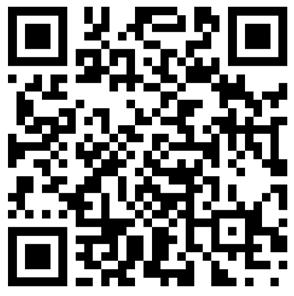
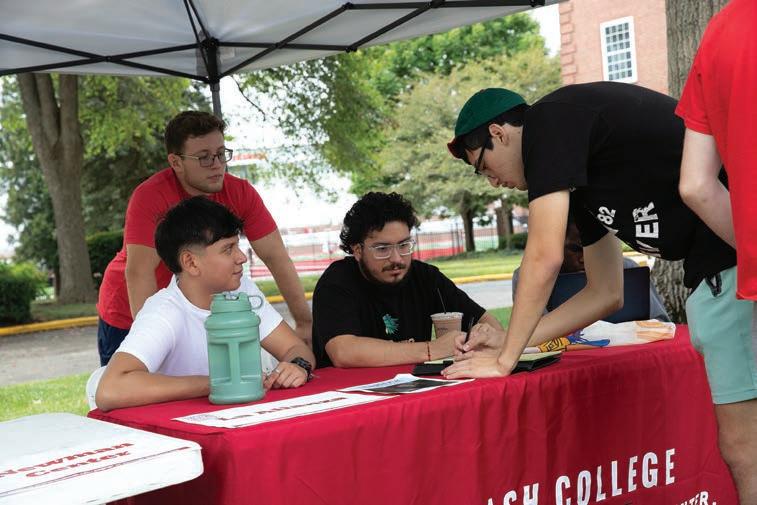
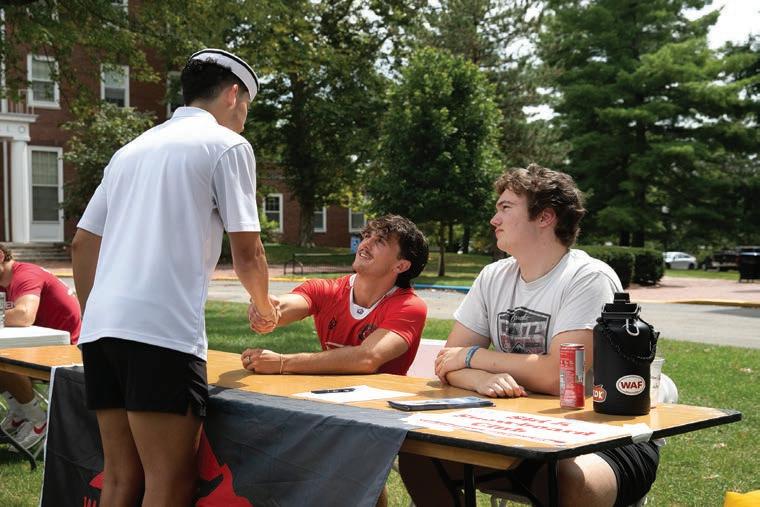
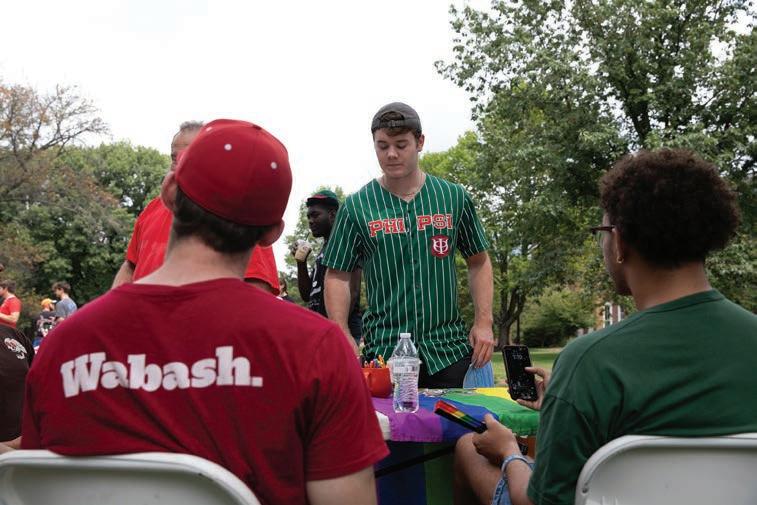
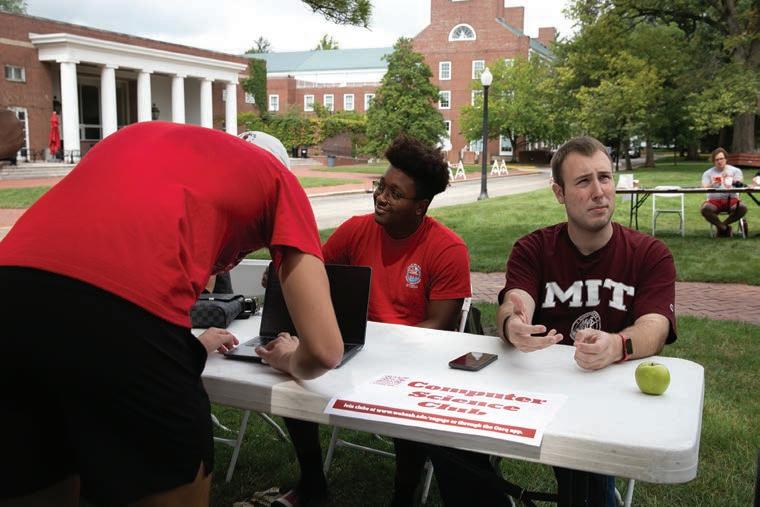
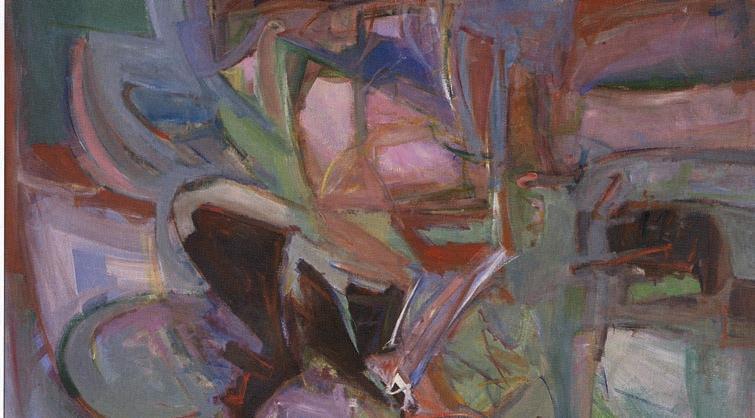
• Friday, September 6
• 4–7 p.m.
• Eric Dean Art Gallery
Student Curators:
• Jonas Akers '24
• Owen Bennett '24
• Lucas Budler '25
• Conner Grimes '26
• Min Heo '27
• Jacob Monninger '24
• Benjamin Weaver '26
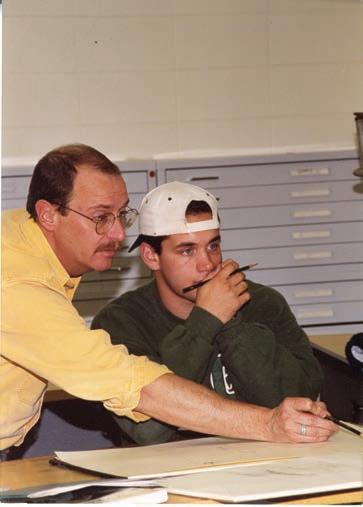

Gregory Huebner, longtime artist, professor and founder of the Wabash Art Department, will be honored in a retrospective showcase highlighting his paintings from 1974 to present day.
The exhibition, titled “Imagining Balance Amid Chaos & Harmony,” serves as a tribute to Huebner's illustrious painting career. His works can be found in 33 public collections and numerous private collections across the Midwest. After retiring from academia in 2011, Huebner continued to expand his oeuvre as the corporate artist-in-residence at Virtusa in Indianapolis.
While at Wabash, Huebner played a pivotal role in establishing the Wabash College Collection of Contemporary Art in 1979, and the College honored his achievements in 2010 by naming the permanent collection gallery after him to honor his enduring legacy.
Through his art, Huebner endeavors to capture the essence of human balance through a diverse range of abstract expressionist techniques. His commitment to "making visible the unseen" is evident in his body of work, which skillfully bridges gestural and color

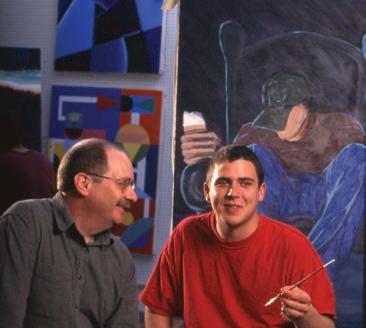
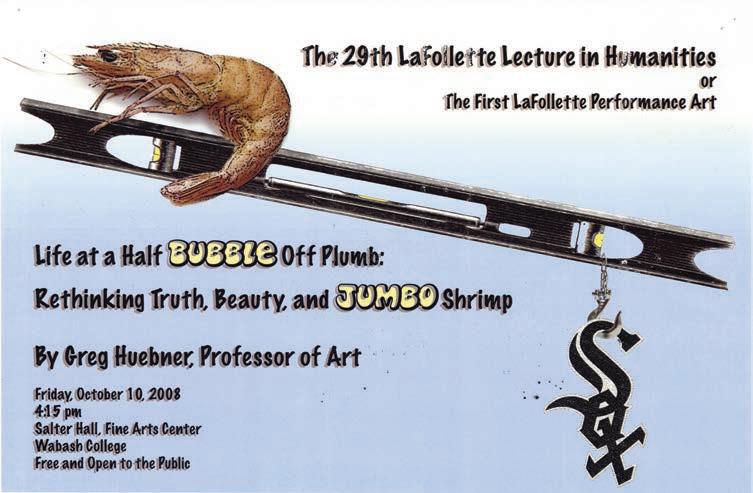
JAKE WEBER '25
STAFF WRITER
Every year, a new class of freshmen rejuvenates campus and provides Wabash College with a plethora of new backgrounds and experiences. This year’s international student cohort represents the largest pool of international students in Wabash College history, with 26 students hailing from 14 different countries. Applying and attending Wabash is an entirely different experience for international students compared to those from within the United States.
While U.S. citizens can cross state borders at will, crossing national borders presents an entirely different roadmap to Crawfordsville than most. International students must be approved for a student or F-1 visa to attend Wabash, which is an unforgiving and complex process. Visa interviews and applications are conducted at U.S. diplomatic institutions in the student’s home country by members of the State Department. Approximately one million F-1 visa students come to the U.S. every year for higher education and high school exchange experiences.
While international students are ultimately responsible for their own immigration status, they receive help from Wabash’s Director of International Programs, Amy Weir, and Associate Director of International Admissions, Chris Dixon. Weir and Dixon assist prospective students through recruitment and additional resources related to their application and immigration status.
“My biggest challenge when coming to [the U.S.] was getting high enough financial aid,” said Phuong Nguyen ’28. “Other than that, it was just to think about finding community and making friends.” Nguyen, from Hanoi, Vietnam, was lucky to have a painless experience getting his visa.
“First, I had a form to fill out, so I asked my dad for help," said Nguyen. "Then, I packed everything up and went to the interview a few weeks later, and eventually got my visa back in the mail. For me, it was pretty easy.”
Not all students are lucky to have such quick success.
Getting appointments at embassies and consulates has proven to be exceedingly difficult. During his time in office, former President Trump’s administration cut the State Department by a third, reducing the staff available to serve across the globe and greatly increasing wait times for application processing. The backlogs and staffing shortages have not seen total resolution under President Biden’s administration either, leaving non-U.S. citizens to deal with the consequences.
But applying for a visa is no rubber stamp of approval. While this year’s cohort saw a 100% approval rate for students from the Czech Republic, Poland, Argentina, Brazil and more, others were not so lucky. Only 50% of applications saw approval in Uzbekistan, and notably, no applications were approved for students from Bangladesh. Bangladesh has been a popular home country of Wabash international students. However, due to intense civil unrest in the country that has seen the deaths of hundreds of Bangladeshi citizens, the U.S. State Department effectively halted all operations in the country. This further delayed and backlogged the visa application system, preventing multiple students from being able to join the Wabash class of 2028 for Ringing In. These unforeseen developments, paired with high rates of fraud identified in Bangladeshi visa applications, causes them to receive intense scrutiny from the State Department and a high denial rate. Caribbean and African nationals face similarly high denial rates, adding to the challenges they face getting to Crawfordsville.
Visas are typically denied for one of two main reasons. Firstly, the immigration officer may deny an application if they determine that the applicant does not have strong enough ties to their home country, or that they seemingly have immigrant intent. F-1 visa students are classified as non-immigrant students intending to return to their home country at the end of their education. If an immigration officer feels that an applicant intends to use their F-1 visa as a stepping stone to citizenship, they may be denied.
Second, a visa may be denied if the immigration officer believes that an applicant does not have enough money to pay for their four-year education in the US. While the law only requires students to have enough money for one year of expenses, international students are also not eligible for subsidized and unsubsidized government loans or Pell Grants. Almost all aid that international students receive comes from Wabash or from their home country, not from a federal program like many domestic students. Previous visa denials are not held against the applicant, so most applicants revise and reapply as many times as needed until they receive their visa.
However, immigration status complications do not end with an approved F-1 visa. International students also face restrictions on their employment while being a student. International students who seek employment while in school must work on campus or for the benefit of the campus. They do not have the ability to work in the broader community or at other educational institutions.
“From the minute F-1 students arrive they are allowed to work on campus,” said Weir. “But, when classes are in session, there’s
a federal limitation to 20 hours per week, so work remains as a secondary. On school breaks and holidays, there is no upper limit on how much they can work.”
Luckily, international students can receive a special allowance for internships in the form of a Curricular Practical Training (CPT). CPTs, which must be an integral part of the student’s program of study, are issued through the registrar’s office and provide international students with a .5 or 1 experiential learning credit at no additional cost. While this credit appears on the student’s transcript, it does not count toward the 34 credits required for a Wabash student to graduate from the College. If a CPT does not appeal to a student, there is a third option in Optional Practical Training (OPT). International students must apply and be approved for an OPT 3-5 months in advance and pay $470 to the U.S. Customs and Immigration Service to be eligible for employment authorization that is off campus and not linked to a CPT.
While the Wabash community does their best to support international students, work is always left to be done. International students denied this year will have the opportunity to join us in the winter or next year when they will hopefully receive a visa — only time will tell.
ASHTON MOORE '25 STAFF WRITER
Perhaps most of all, Wabash is well known for its close ties to its alumni. Graduates plant their roots far away from Crawfordsville, and many large pockets of alumni form across the country and the world. However, many Wabash men decide to return and serve their alma mater, sometimes directly after graduation. Whether it’s as a coach, professor or staff member, alumni litter the campus and continue to make direct impacts on the College that they used to attend.
It’s a far from foreign concept to return to work at your alma mater. However, when Wabash graduates, a relatively tiny group compared to other schools, have such a wide spread of alumni around the globe, what compels them to return to Crawfordsville?
To begin, look at a man like Jacob Riley '20 who returned to mentor generations of Wabash men after him. A double major in English and History during his time as a student, Riley joined the Professional Development Staff as a Career Advisor in 2022. His current role, not far flung from his time as a writing consultant for the Writing Center, is to aid students in crafting cover letters and resumes, as well as generally advising them on how to better
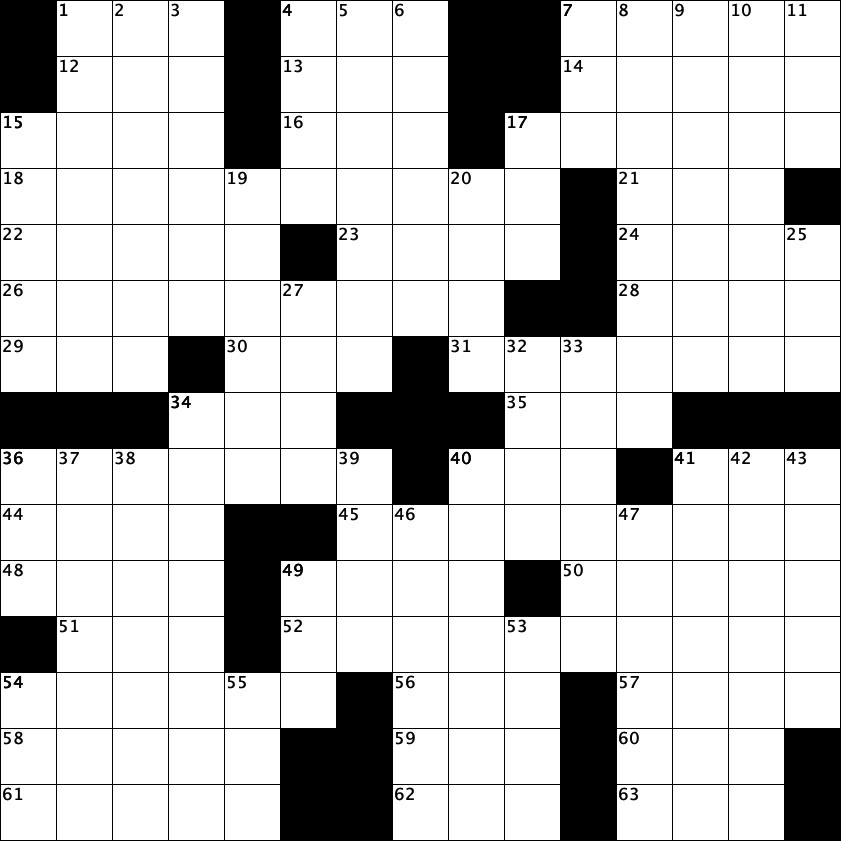
Across 1. Certain red, for short
4. Scale display: Abbr
7. 12–11 ending, in D.C.
12. French menu words
13. Ctrl-___-Delete
14. Loverboy
15. Slightly
16. It's good for absolutely nothing, per a 1970 song
17. Down in the rubbish dumps?
18. *What a chloroplast might cook up?
21. Vax, slangily
22. Word before man or Mongolia
23. “The Bridge on the River ___”
24. View from Cedar Point
26. Suffocating quality
28. Gelatinous soup thickener
29. LAX letters
30. Many a USAA policyholder
31. Oysters and chocolates, allegedly
34. Command to a dog
35. Untrustworthy, in Gen Z slang
36. “I like to keep ___ of my ignorance” (Arthur Miller quote)
40. Hi-___
41. Terre Haute-to-Indianapolis dir.
44. Wheedle
45. Notes used in throat singing
48. Parts of a tea set
49. Booking.com booking
50. Arabian Sea feeder
51. Certain game piece
52. *Where you might hear 18-Across, 8-Down and 34-Down, for short
54. Gobs and scads
56. Assign, as blame
57. Smooth over, with “out”
58. Satiates
59. Cooler cooler
60. Chess pieces
61.Meetup for 14-Across
62. Neighbor of Homer on "The Simpsons"
63. Mag. staff
Down
1. President's advisors
2. In sync
3. Clean, say
4. What some bills become
5. Covering of snow, e.g.
6. Camel's-back breakers?
7. Go ___ (get paid)
8. *X chromosomes you can buy at the store?
9. Trade off?
10. Like the 2024 olympic basketball bronze medal team
11. One of a foot's five
15. Dress that widens on the way down
17. Word with jump or jet
19. Popular pub contest
20. Play list?
25. Hosp. areas
27. Tennis dividers
32. App purchaser
33. Bucolic
34. *Marketing gametes?
36. Org. for Seminoles and Tar Heels
37. Victorian-era sitting room 38. At a fast clip 39. Swimmer ___ Huske
Substitute
Stuck it out 42. They've got some nerve! 43. German steel city 46. You fiddle with it
Prompt
“The Big Bang Theory” channel
Leered at
Frequently, poetically
Abbreviation beside many a company logo
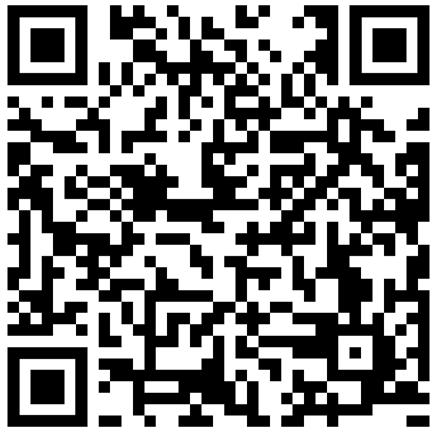
prepare for the job search. After graduating in 2020 during the peak of COVID-19, he found himself understandably stressed over finding a first step for his career.
“When COVID-19 hit that March, we were ushered off campus for spring break and told not to come back,” said Riley. “I had a hard time with my own career development plans, I probably didn’t put in as much work as I should have into making sure I wasn’t in that situation.”
Riley eventually found a role working within the pharmaceutical industry. While it gave Riley financial security and allowed him to make some progress in his career, it was something that he couldn’t fall in love with. The professional itch had not been scratched, but he had the feeling that he knew exactly where to start looking. Having also worked for Career Services in his time as a student, he decided to reach back out to them.
"Peer mentoring has always been something that I’ve loved doing to this point,” said Riley. “And I had reached out to Cassie Hagan as one of her former employees to see if she had any help with my job search. This job happened to be open, and she had taken over as director about six months prior.”
For Riley, the rest is history, and he has not looked back since.
Conner Taylor '24 is an even more recent example, having studied Classics before his graduation last spring. However, his role is the inverse of Riley’s; Taylor is concerned with getting students into the college successfully, rather than aiding them on the way out. Taylor has taken on the role of Assistant Director of Admissions, a role that he admits he did not really expect to get as soon as he did.
“In my senior year, I wanted to get into higher education,” said Taylor. “I interviewed at some places and, at the time, didn’t get them. Fortunately, I didn’t, because then I was able to work here at Wabash, and I am really thankful for that.”
This sudden turnaround from student to staff seemed to be as surprising to Taylor as anyone else. While the opportunity to work as an admissions intern for Wabash exists, Taylor never took that opportunity, instead taking other opportunities such as an internship under Indiana Senator Todd Young. Despite not having worked in admissions previously, the self-proclaimed “fresh-out” Taylor managed to land a role within Wabash’s admissions office.
“It wasn’t my initial plan to be back this early, but I’m glad it worked out in the way it did,” said Taylor. Both Riley and Taylor can’t help but gush about Wabash. Regardless of their sudden or unplanned returns, they both stated that their time at Wabash inspired them to want to better the lives of current students.
“I wanted to be involved with the college in some way, not just as a donor and alumnus,” said Taylor. “That’s kind of how I wanted to get into admissions and higher ed in general, it’s because of Wabash and the impact it had on me, knowing I could pay that forward to the next generation.”
This sentiment doesn’t exist in a vacuum either. Taylor was about as involved as a student can be. During his time at Wabash, he played on the golf team, was a house manager at Delta Tau Delta and was also involved in both the Wabash College Republicans and Sons of Wabash. When asked about his main pull to return to Wabash, he mentioned how he was never destined to be a student, being the son father that graduated from DePauw and a mother that currently works as DePauw archivist.
Taylor's unique experience in becoming a Wabash student has allowed him to thrive in a role where his whole job is to convince families that Wabash is a good investment.
“I think I can relate to students when trying to explain the appeal of why I chose Wabash,” said Taylor. “Trying to spread the fame of her honored name as much as I can is definitely one of my goals.”
Riley was also well involved as a student, spending four years on the swim team and serving at the Writing Center and Career Services. In particular, he credits both Associate Professor and Director of the Writing Center Zachery Koppelmann and Cassie Hagan for equipping him with the skills he needs to get his job done at a high level.
“The training that I got here as a staff member from Cassie and through Dr. Koppelmann’s and his class with peer mentoring help me help everyone out,” said Riley. Both Taylor and Riley have thrived professionally in their roles upon their return to the College, but also personally as well. Both act as examples of the benefits of hard work and involvement as students on campus. While Taylor guides the young freshman through the door to four of the most impactful years of their lives, Riley sees to it that they reap the rewards of those four years and dive into the workforce prepared and organized.
Both men have used their Wabash experiences to great effect, helping perpetuate the culture that still rings strong from students to staff. When asked about the distinction between the culture of the students and the culture of the staff, Taylor downplayed the seemingly vast difference.
“Wabash is Wabash,” said Taylor. “People that have been here for a long time get that.”
NOAH MCROBERTS ’25
STAFF WRITER
MALACHI MCROBERTS ’25
STAFF WRITER
New faces will debut on the field and the sidelines as the new-look Wabash College roster squares off against a similarly unfamiliar opponent. You might be wondering, “Who even is St. Norbert College, and why are we playing them on opening day?”
The last three years have seen some sizeable changes to the North Coast Athletic Conference (NCAC) lineup, with Allegheny’s departure after the 2021 season, the announcement of John Carroll’s arrival in 2025 and the report that Hiram would be following Allegheny out of the conference.
“Non-conference football scheduling at Wabash College is a challenge,” Athletic Director Matt Tanney ’05 said.
Further compounding the issue of conference mobility is Wabash’s competitiveness in football.
“When you are routinely a top-40-type team, the rest of the division isn’t excited to come to Crawfordsville on a Saturday afternoon,” said Tanney.
Since we watch Wabash beatdown on teams like Oberlin and Kenyon every year in football, us Wallies have probably been presented with a skewed view of Division III football.
The majority of the three hundred-odd teams in the country play on a closer level to that of Hiram College.
Some of the top-flight teams in the country experience a similar problem with getting teams to play them, but teams like Mary Hardin Baylor, North Central and some satellite schools of the University of Wisconsin have a much more extensive travel budget.
However, Wabash doesn’t quite have the same resources for sending schools around the country. So, the question is, how will Wabash find teams to play?
“These games develop

in a couple of ways: one is through conversations with coaches and administrators, and knowing people at different institutions that have a need. Sometimes your needs match up,” said Tanney. And ultimately, the scheduling isn’t much more complicated than that. Tanney even described the opportunity to play Butler during the 2023 season as a one-off that was available because of Allegheny’s absence, and Butler needed an extra game.
But Tanney expressed that Wabash won’t take just anyone in a non-conference game, and this is something that Head Coach Don Morel expressed as well.
“We would love to play a team equal to us,” said Morel. “Beating somebody 62 to nothing doesn’t get you anything.”
For Coach Morel, the primary goal is to get off to a great start with a
win against a high-quality team, and Morel thinks we’ve lucked out with scheduling a couple of games with St. Norbert.
“I think St. Norbert and Wabash is a really good matchup,” said Morel. “And it will make us better for next week when we play a conference team. They’re well-coached, and they’re going to be a good football team.”
With that, Morel said it has been tough to get a great read on the team in preparation.
“The biggest challenge we’re facing is we don’t know what they’re going to do. It’s game one, so... you end up trying to prepare for everything.”
Wabash’s almost entirely new offense hopes to retain some of last year’s production going into their season opener. It will be hard to replace last year’s high-powered offense, after losing almost the entirety of the offense’s skill position groups. But the new Wabash offense, led by quarterback Blake White ’25, will need to show out against St. Norbert’s defense.
Last year St. Norbert allowed 17.3 points per game, allowing only two teams to score over 21 points against them, one of which was #16 ranked Aurora University. With nearly a guaranteed decline incoming from Wa-
“I think St. Norbert and Wabash is a really good matchup,and it will make us better for next week when we play a conference team.”
-Head Football Coach Don Morel
Although St. Norbert’s rushing attack was incredibly strong last year, boasting 163 rushing yards per game and 26 touchdowns on the ground, they graduated both of their starting running backs, who had a combined total of 1,620 yards and 20 touchdowns across 332 combined attempts.
With a potentially depleted rushing attack, the Green Knights will have to rely on their junior quarterback Peyton Lyon, who passed for 1,908 yards, 13 touchdowns and 10 interceptions, and boasted a 56% completion percentage last season. Less than stellar numbers last year for Lyon, but he retained his three primary receivers from last season. Although, Wabash’s secondary was by far the Little Giants’ greatest weakness last season, giving up 7.15 yards in the air per attempt, they retained almost their entire starting unit, so the continuity and coaching of new defensive coordinator Jake Gilbert ’98 will most likely lead to a huge boost in defensive production.
With a lot up in the air for the upcoming matchup, Wabash will have a chance to test itself against a quality opponent before opening up NCAC play on September 14 at home against Ohio Wesleyan. However, there’s still a lot more to find out, so make sure you pack Little Giant Stadium on Saturday to get a real taste of who St. Norbert is and how the new look Little Giants will perform this season.
bash’s 41 points and 493 total yards per game, there is cause for concern about how Wabash’s new guard will be able to handle St. Norbert’s stout defense. Blake White and the entirely new receiving core will have to be the driving force for the Little Giants’ offense against the Green Knights; last year the Green Knights held their opponents to a measly 2.7 yards per carry and 96.5 rushing yards per game. However, St. Norbert’s defensive secondary tended to falter more than not, allowing 7.1 yards per attempt. Although the Little Giants’ offense is highly unpredictable due to the lack of continuity, there is an upside to the Little Giants’ defense: they only lost one starting defensive player. With an entire extra year of growth and chemistry built up, there should be a sizable, expected jump in defensive production this season for Wabash football. The defensive front seven was the major strength of the Wabash defense last season, and with fifth-year senior Steven Thomas ’25 returning for his last season to work the inside with other fifth-year Will Olive ’25, opposing tailbacks should be wary this season.
NICK WANGLER ’27
SPORTS WRITER
Following a stellar season that ended with a 2023 Men’s Cross Country Title, the Redpack is biting at the chance to lace their shoes up once again. With just days until their first meet, the Little Giants are hoping to have the same sort of success they found last season.
As seniors graduate and freshmen are welcomed, every year the new team has a different feel and identity to them. Sometimes, this change is drastic while in others the team can pick up right where they left off.
“We have to continue to do the little things while being professional and identifying what we can improve on across the board.”
-Head Cross Country Coach Tyler McCreary
“It’s very similar to last year,” said Head Coach Tyler McCreary. “I think we turned a corner last season with their mentality and how they conduct themselves as well as how they compete.”
On a smaller roster of just 21 runners, graduating four seniors can have a big impact on a squad. Although the seniors from last year brought tremendous lead-
ership and effort, it seems like the four seniors this year are filling in the missing spots.
“The seniors have an incredible amount of experience”, said McCreary.
“They are going to bring a tough, competitive nature as well as a good level headedness into what we need to do every day to get better.”
As the seniors have instilled work ethic into this young team, the runners have begun to bond as a group. Senior leadership with a mix of talented young runners is a great mix for a successful team. An important aspect of a team is the chemistry between players.
“We have some veteran leaders that are showing the young guys the ropes, and with that the young guys are pushing the veterans on the course,” said Brayden Curnutt ’25.
At the beginning of the season, every team likes to identify season goals for the program. These include short-term and long-term goals, ideally where the short-term goals lead to the achievement of the longterm goal. The Redpack must stay focused every day to prepare themselves for the upcoming meet.
“We have to continue to do the little things while being professional and identifying what we can improve on across the board”, said Coach McCreary. “Ideally, then we just show up to Terre Haute ready to give it a go.”The first meet can
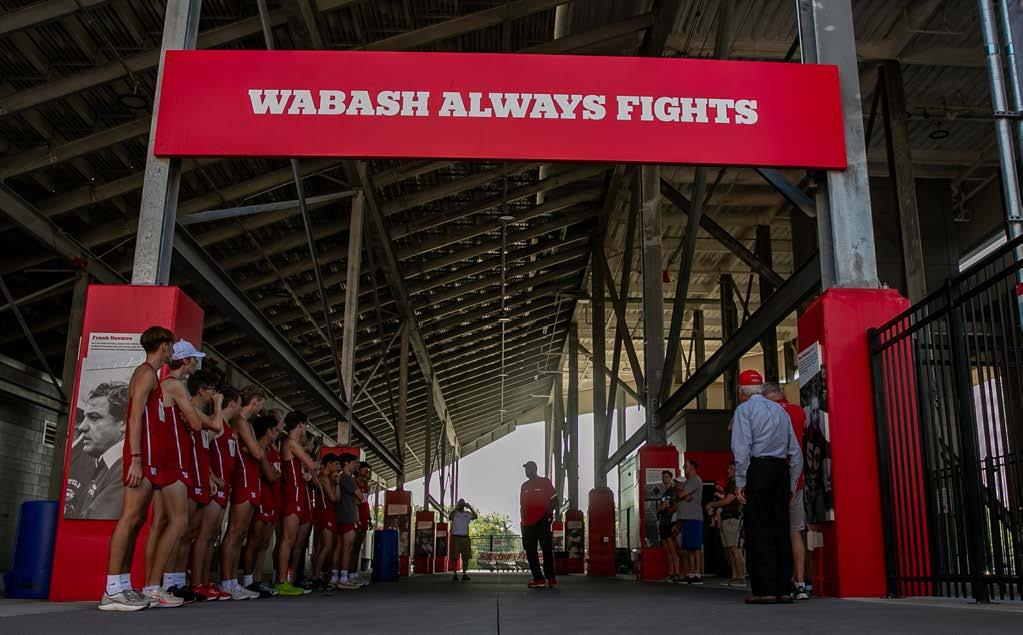
always be a tricky one, but this one is different than in the past. The Little Giants will be competing in Shelbyville at the Franklin College Invitational on September 7. Typically, this event is only a 5k but this year it will be run as an 8k. Wabash will see this course later in the season as it is the site for the Great Lakes Regional run. This early in the year, it could be difficult for runners to be prepared for such a long race. “We are going to look at it as a competitive workout type of an effort, not caring
about where we necessarily place,” said McCreary.
The Redpack is bound to have yet another breakout season, and this first meet will just be the starting point. A young talented mix of runners along with experienced seniors has proven to be successful in the past. The Little Giants seem to certainly be headed in the right direction towards a consecutive NCAC title.
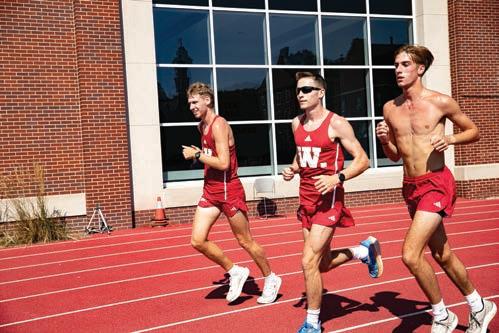
HAIDEN DIEMERMCKINNEY ’26
STAFF WRITER
After a long ten months off the field, the Wabash College soccer season couldn’t have started with a more exciting finish than their opener. On Monday, September 3 at Principia College in Elsah, Illinois, tied at 1-1 in the 88th minute of the match, midfielder Alfredo Campos ’27 scored an unassisted goahead goal to seal the deal for the Little Giants victory, 2-1.
“We had a cross come in front of the left side and the ball rolled slowly out of the box,” said Campos. “I knew the goalie couldn’t get there in time, so I positioned the shot to the far post with some power.”
shots on goal. Head Soccer Coach Chris Keller believes this strategy can work in their favor moving forward.
“Our front half of the line is more experienced this year, so our goal is to outshoot everybody we play,” said Keller.
Then with time ticking, Campos took command with the game-winning shot to set the tone for the 2024 season.
“Overall, this win gave the team confidence more than anything,” said Campos. “Most teams who give up a goal late to tie the game drop their heads, but we saw if we work together and stay mentally strong, we can get the results we want.”
“Coming off the bench, it feels great to make an impact. I thank my teammates and coaches for their support, they gave me confidence to make that game-winning goal. ”
-Angel Vazquez ’26
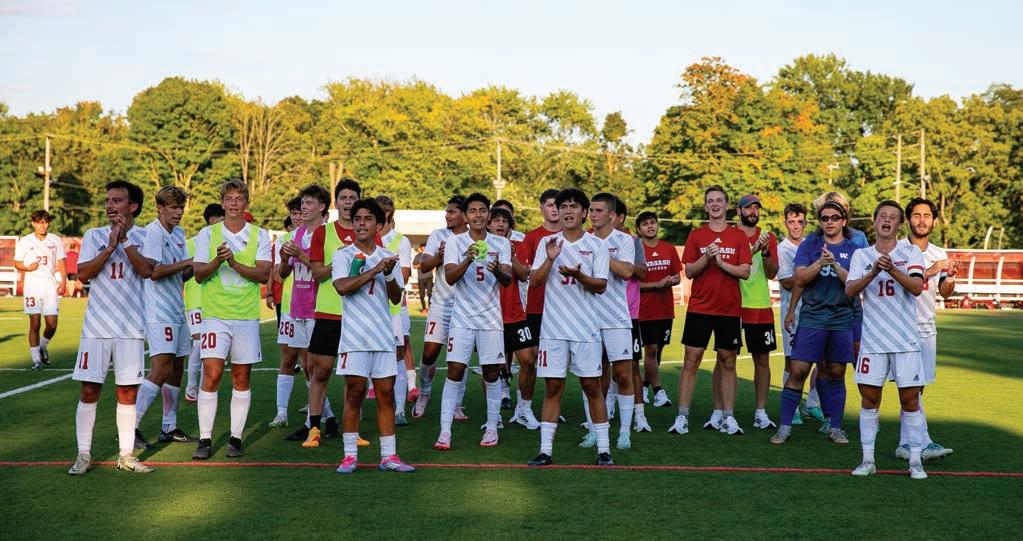
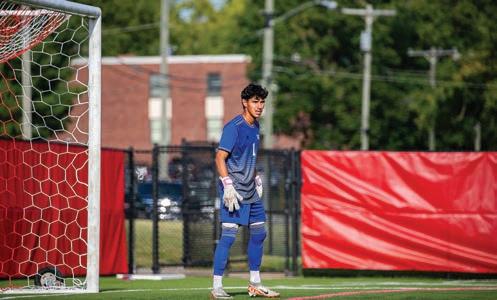
Wabash (1-0) began the match with a bang when midfielder Jose Escalante ’26 put the ball in the upper-right corner of the net just two minutes into the game. The goal was assisted by forward Bryce Kinnaman ’27 and midfielder Bruno Zamora ’25, which was the only point on the board until the Panthers of Principia evened the match at 1-1 in the 75th minute.
“If we score first then we set the tone and take control of the game,” said Escalante. “A lot of teams panic when they score in the first minute, but for us our subs had confidence when they came into the game with the lead.”
Although there was no scoring for most of the match, the Little Giants outshot the Panthers 16-5 with a 5-4 advantage with
The team experimented with their depth as 18 players saw the field on Monday. Although no substitutes put numbers on the stat sheet except forward Jesse Martinez ’26 with three shots, Keller believes his depth players meshed into the flow of the game fairly well.
“Monday was the first official collegiate game for a lot of those guys,” said Keller. “They had a little bit of nerves early on in terms of passing, but they settled in the second half.”
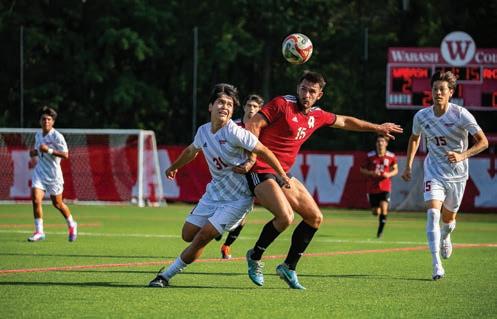
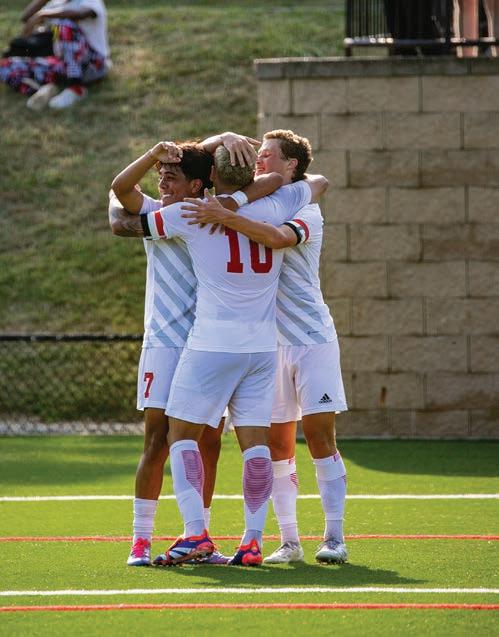
With a quick turnaround, the team looked to rely on their depth for their home opener against the Fightin’ Engineers of Rose-Hulman on September 4. Similar to their game against Principia, the Little Giants jumped to a 2-0 lead in the first half with Escalante scoring in the 29th minute and Angel Vazquez ’26 coming off the bench to build on their lead in the 33rd minute.
With a gritty effort, the Little Giants sealed the victory 2-1 and are now 2-0 to begin the 2024 season.
Although the Fightin’ Engineers crawled back into the game scoring in the 70th minute, Wabash’s strong and stingy defense kept the ball out of their box and limited shots on goal in the last 15 minutes.
“Coming off the bench, it feels great to make an impact,” said Vazquez. “I thank my teammates and coaches for their support, they gave me confidence to make that game-winning goal.”
Keller knew there were some difficulties with his team’s decision-making, but he admired the group’s composure to finish strong and end victorious.
“What’s different about this group from last year is we’re putting each other first,” said Keller. “We went deep off the bench and it was a team effort to win
every 50/50 and close out a game which we had issues with last year. It’s great to win two close games early on in the year.”
The soccer team will be back at home this weekend for the Robbie Dreher Classic, playing Alma College on September 7 and Bluffton University on September 8.
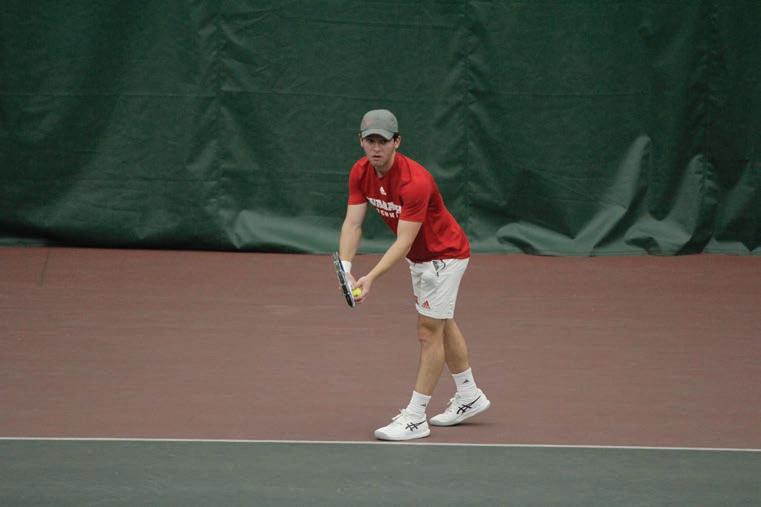
ETHAN WALLACE ’25
SPORTS EDITOR
Wabash tennis will tackle a fall schedule with a number of changes from previous years. Entering its fifth year under Head Tennis
Coach Daniel Bickett, the program is taking several steps that signal a leveling-up from previous years.
The most obvious change to the tennis program – for students on campus – is the loss of three of the outdoor courts, which are occupied by Grub Hollow, the mobile kitchen modules that will be housing Independent dining after the demolition of Sparks.
“The benefit of the Grub Hollow situation is, at least we maintained our indoor courts,” said Bickett. “Losing those would have been a real challenge, considering most of our spring season takes place from January to May. Practicing with a large team on three courts at this point is nothing new to us.”
For the fall season, practices are split between the
three indoor and three remaining outdoor courts.
The only major impact that the situation will have is that Wabash will not be able to host an invitational due to lack of court space.
Tennis will play a condensed fall schedule compared to previous years, as Bickett pushed an invitational to the spring calendar. These schedule changes are all meant to help the team develop their massively improved roster, driven by the recruiting that has skyrocketed Wabash from the bottom of the North Coast Athletic Conference (NCAC) in 2022 to backto-back appearances in the conference tournament semifinals in 2023 and 2024.
This year the team adds five freshmen to the lineup.
The team graduated Cole Borden ’24 and Liam Grennon ’24 at the end of last season but returns all other major contributors.
“[Bickett’s] biggest strength is recruiting, es-
pecially at an all male college,” said Jett Brownlee ’25. “The fact that he can get the level of talent that he does in Indiana is impressive. And over the last four years, it’s been impressive
to see a team whose number one singles player was an eight UTR [Universal Tennis Rating] grow so that now the entire lineup is stacked with eight UTRs.”
The team will open at the University of Wisconsin White-Water Warhawk Fall Invitational on Friday, September 6 continuing into September 7.
This will be the first time the team attends this invitational, and it is the strongest group opponents Wabash has opened against in many years.
“This is an opportunity to get us an invite with a skill set with other teams that I felt could really push us,” said Bickett. “At that invite there will be three Division III schools, but then the other three schools are all scholarship schools.“
The only returning event from last year’s schedule is the ITA tournament, which will be September 20 to September 22. Then the team will play two JV
matches both new to the schedule and intended to develop the deep bench that has been built up over the past few seasons.
step up the Division III ladder and are a notable team in the region and hope to move into national rankings over the next few years.
“This [Whitewater invitational] is an opportunity to get us an invite with a skill set with other teams that I felt could really push us.”
“Those JV matches provide our bench guys an opportunity to go out, get some high level matches,” said Bickett. “Because sometimes those guys who aren’t necessarily in the top six, when they get in, it can be just a really quick, easy match. And there’s not much necessarily developing off those kinds of matches. So we want to provide them an opportunity to go out and play challenging opponents.”
This season the team’s focus will be to take another
-Head Tennis Coach Daniel Bickett
The process will require continual focus on increasing schedule strength. The process will take time, but fans of Wabash tennis can look forward to a team that makes every year better than the last.

ETHAN WALLACE ’25
SPORTS EDITOR
A member of the golf
team, a broadcaster and a Student Athletic Advisory Committee (SAAC) executive, Sean Bledsoe ’26 is ingrained in Wabash sports like no other. Whether you’ve watched him on the golf course, seen him with a microphone on the football sidelines, heard him broadcasting basketball and volleyball or sat next to him in an executive meeting, you’ve probably already seen Bledsoe while following Wabash athletics.
Few people take as much time out of their week — on top of classes — to be part of Wabash sports. What is it that makes Bledsoe dedicate so much time to sports?
“I have grown up being around sports,” said Bledsoe. “I played football, baseball, soccer and, obviously, golf. In high school… I got into doing a sports talk show my sophomore year. Then that translated into sports broadcasting in college. It has become an avenue for me to stay in the sports realm. Sports have done so much for me in my life, and it’s something where I can’t see my life without sports.”
Through his first two years on the team, Bledsoe has been the standout underclassman for the Little Giants. He appreciated his role on the team and focused on contributing how he could with his talent at swinging a club.
“My first two years, we had a lot of upperclassmen in the lineups,” said Bledsoe. “I was really the only underclassmen in the lineup. Occasionally, we’d have
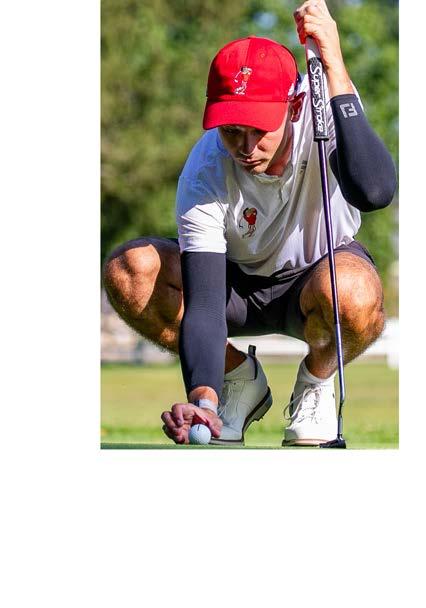
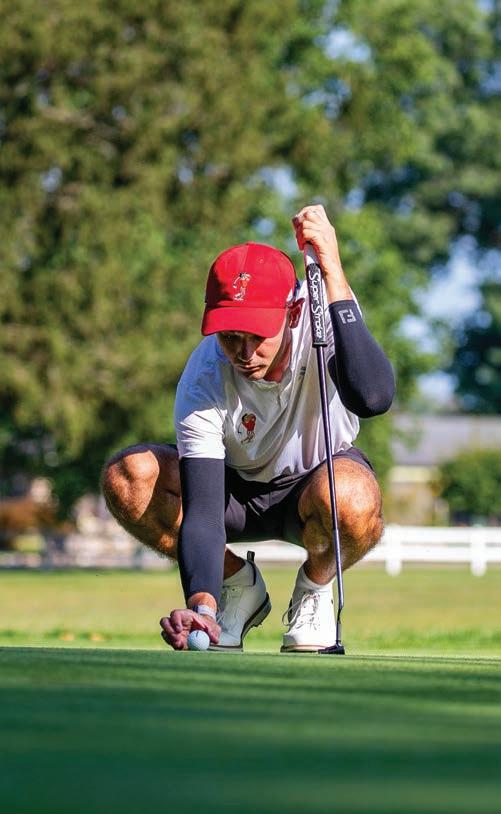
someone else. At that point, as someone that’s an underclassman, usually you’re not a vocal leader. I felt like I tried to lead by example or lead by my work ethic.”
As he steps into his junior year, Bledsoe will take on more leadership within the team. He wants to encourage the team to let sports permeate through their lives. Focusing on building bonds that extend outside of practice hours, Bledsoe
hopes that his teammate can be more than just a group of guys who golf.
“Now I find myself as an upperclassman,” said Bledsoe. “That’s something that I don’t take very lightly. Being a vocal leader is something that every team and sport needs. You need a vocal leader, whether it’s one or a couple, but you need it. And so in my role this year, I’m really trying to preach team chemistry.”
“I want to build a team that enjoys being around each other outside of golf,” said Bledsoe. “At the end of the day, yes, we play college golf, but also for our brothers here at Wabash we always want to be there for each other. We see each other every single day.... And so it’s good to get to know them outside of golf. That’s something that I really want to preach my last couple of years. Be brothers for each other outside of the golf course.”
As a golfer, Bledsoe gets to experience the unique bonds of being on a team with close friends. In a sport that is often described as an “individual” sport, Bledsoe finds the most important piece to be the sense of teamwork.
“I think that having your teammates be your brothers outside of sports, outside of practice and outside of games is huge,” said Bledsoe. “You’re able to have a bond with someone, not just for the two hours that you’re at practice. I’ve had plenty of conversations outside of practice with a bunch of my teammates, and it hasn’t been anything golf related. It’s been about things like personal life plans for the future. I think that’s huge to have a lifelong bond with someone.”
It’s easy to get caught up in the final score of, but what you take away from the game is much more important than anything that happens on the court or course. Bledsoe hopes to make the most of his time with Wabash athletics by getting involved in sports off the field and with people who make them count.
Pouring rain, strong winds and less than ideal playing conditions didn’t stop the Little Giants from competing in their first tournament of the season.
The Little Giants traveled to Kentucky for the Transylvania Fall Invite on August 31 and September 1 to face-off against 19 other teams at the University Club of Kentucky.
Sean Bledsoe ’25 led the way for the team with a 36 hole score of 141 (3 under par) which earned him all-tournament honors and the North Coast Athletic Conference (NCAC) Golfer of the Week award.
“The only thing I was really thinking about was playing smart, committed shots,” said Bledsoe.
“That’s one thing I was really trying to focus on over the summer… I feel like I did a really good job of that this weekend.” Matt Lesniak ’25 and Lewis Dellinger ’25 were next in line for the Little Giants firing scores of 150 (six over par) and 156 (12 over par). Robert Pruzin ’25 and Dylan Barkley ’26 rounded out the scoring with 74th-place and 86thplace individual finishes.
As a team, the Little Giants placed 11th out of 19 competitors.
“Sean played very well as I was expecting him to,” said Head Coach Justin Kopp ’21. “This summer Sean asked multiple times what he needed to work on to come into the season competing to win tournaments. Each time he asked I emphasized the importance of his leadership and the mental side of the game. This tournament was the best tournament I have seen Sean play on the mental side of the game. Sean has all the ability to play like this every round and it’s great to see his maturity and hard work shine through. I challenged Sean to continue to improve the mental side of the game and back up his performance the rest of the year.”
As the team continues to progress, the starting five is likely to remain dynamic following the loss of three senior starters last year. A new freshmen class as well as developing players have created a fierce competition week-in and weekout.
“This past tournament helps create a lack of clarity in the top five which is
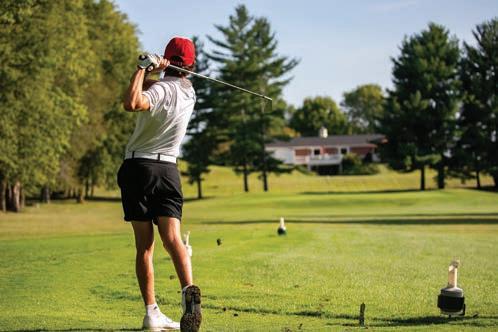
sometimes a good thing,” said Kopp. “Right now we have a lot of players who could compete for a top spot in the lineup. Lane Notter ’28 played very well as an individual and I’m excited to see him continue to improve this season. Mason Pierle ’28 also had a solid tournament and showed a lot of the things that we’re looking for in somebody who would be in our top five. In the fall, it’s good to have several players get experience in the top five, but once we get to our conference championship, we want it to be very clear who the five guys are that give us the best chance to win conference.”

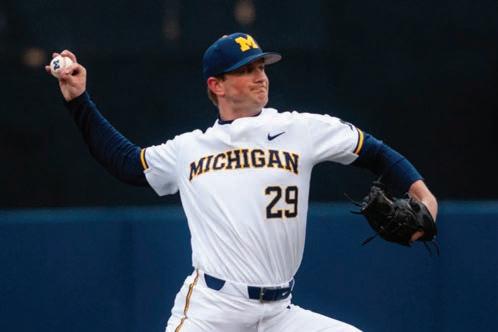
ETHAN WALLACE ’25
EDITOR
SPORTS
Wabash baseball welcomes its new assistant coach and pitching coordinator Mac Lozer. The announcement was made Thursday, August 29 that Lozer would fill the role left open when former Associate Head Baseball Coach Jordan Niespodziany left to accept the head position at DePauw. As far as experience goes, Lozer has it all. He attended and played for the University of Michigan, where he was second all-time in total appearance. He was drafted in the 2017 Major League Baseball Amateur Draft, which sent him into the New York Mets’ farm system where he played until retirement due to injury. Afterwards, he began coaching. He spent time as a player development assistant in the minor league for the Los Angeles Dodgers, a program assistant at the University of Michigan and as a pitching coach at Brebeuf Jesuit Preparatory High School.
Lozer, like so many others who grew up in Indiana, had a few connections to the College even before he was hired.
are around baseball and particularly pitching, but he also did a nice job talking about his plan for the mental side of the game, and so I think he just provided a really well-rounded coach that will approach development from a lot of different angles.”
Lozer brings a number of unique qualities to the program. One that stands out is his youth and recent playing career. On top of helping him connect with players, the recent experience means Lozer has been on the mound with the new technology that is changing the way pitchers approach the game today.
“Sometimes, the further they get away from playing, a lot of coaches forget how tough this game is,” said Martin. “And he [Lozer] played recently, he has coached recently with the same technologies that are around for pitchers to use today. So, I think in a lot of ways, being a younger coach recently removed from playing is an advantage.”
Looking to improve off of their opening performance, the Little Giants will travel to Wisconsin to compete in the Midwest Region Classic on September 20 and 21. The tournament will include over 14 teams from across the country and be played at the Brighton Dale Links course in Kansasville, Wisconsin.
“My grandfather, Alan Stanford, was a Wabash graduate in 1963,” said Lozer. “I remember the days when I was growing up, under his wing, and he would take us to football games when he would come back for alumni events. So I have an ingrained history of Wabash from a young age. l also played the Indiana High School Baseball North/South All-Star Game here at Wabash in 2013. So throughout my life, I’ve had a few stops at Wabash and I’m really thankful to have a professional career here now.”
Lozer will immediately begin at the position and start working on developing the team through their fall training schedule.
“He [Lozer] is really passionate about player development and pitcher development,” said Head Baseball Coach Jake Martin ’05. “He is really strong in the area of implementing the new technologies that
Lozer will take a unique vantage when training his pitching core, focusing on more than just the mound. His goals start with the understanding that sports don’t last forever and athletics offer more than just what goes on on the field.
“My goal is developing these guys on and off the field,” said Lozer “Development off the field [for a player], is being a Wabash man currently and – in the future – being the man that they want to be, doing things right in life. Then as a pitching staff, we want to relentlessly attack the strike zone.”
Stepping into a new role, Lozer brings a vision for developing players that seems distinctly Wabash.
